Digging Deep into Purpose and Importance of Reflective Essay

Reflection writing is a powerful tool for students and professionals as they offer a unique opportunity for self-exploration, growth, and understanding. This guide on the importance and purpose of reflective essays aims to change your perception of writing and shed light on the many benefits of incorporating reflection into your life. With our amazing paper help resources and expert guidance, you can master the art of reflective essay writing and unlock your full potential.
Table of Contents

What is a Reflective Essay?
A reflective essay is a type of writing that allows the author to explore their thoughts, feelings, and experiences in a structured and analytical manner. This form of writing encourages critical thinking and personal growth by examining the author’s experiences, thoughts, actions, and reactions.
Reflective essays often focus on personal development, learning experiences, or the impact of specific events on the author’s life. However, reflection writing is also used for college essays or other forms of academic writing.
Types of Reflection Writing
Reflection essays come in various forms, each with its unique focus and purpose. In this note, we will delve into five types of reflective writing;
Personal Reflective Writing
Professional reflection, academic reflective essay, creative reflection.
- Social or Cultural Reflection Writing
Understanding these different approaches will enable you to choose the most suitable reflection essay type for your needs and make your writing more coherent, insightful and trustworthy.
Journaling, manifestation dairies, and written meditations are common ideas. But would you believe these are all forms and branches of personal reflection writing?
Personal reflection essays explore what you’re going through, emotionally, mentally, and provide insights. These could be about their learning, inner conflicts, resolutions and growth.
This type of reflective writing allows individuals to examine their values, beliefs, and actions, fostering self-awareness and personal development.
Personal reflection essays may focus on topics such as significant life events, personal challenges, or the impact of relationships on one’s identity and growth.
Professional reflection writing is common in academic or workplace settings. They involve analyzing personal and professional skills and challenges and identifying areas for improvement.
This reflection essay encourages individuals to examine their professional experiences, decisions, and outcomes, fostering critical thinking and problem-solving skills.
Professional reflection essays may focus on workplace conflicts, leadership experiences, or developing specific professional competencies.
As a college paper writing service platform, we know that most students are intimidated by reflective essay writing. In an academic setting, the reflection essay blurs the lines between informal and formal writing.
You might be assigned an essay account of your experience with an event, but you’ll still need to follow strict rules of academic writing, i.e., formatting or organizing a paper .
Academic reflective writing involves analyzing and evaluating academic materials, such as readings, lectures, or research projects, and connecting them to personal experiences or broader concepts.
It encourages students to engage with course content on a deeper level, fostering a better understanding of the material and its relevance to their lives and future careers.
For example:
You can be assigned to write a reflection essay on modernism in literature . You’d have to write your thoughts and observations about this era. Still, you must follow the rules like citation, proper referencing, and contextual analysis of the ideas presented in that era.
Creative reflection essays are often utilized in artistic or creative fields, allowing individuals to examine their creative process, inspirations, and outcomes.
This reflective writing fosters self-awareness, critical thinking, and artistic growth, enabling individuals to explore their creative motivations, challenges, and successes.
Creative reflection essays may focus on topics such as the development of a specific artistic project, the influence of personal experiences on one’s creative work, or the role of collaboration in the creative process.
Social or Cultural Reflection
These reflection essays focus on exploring and understanding social or cultural phenomena. It involves analyzing personal experiences, observations, or interactions with others and reflecting on their significance and broader societal implications.
Social or cultural reflection essays encourage individuals to engage with the world around them, fostering empathy, critical thinking, and a deeper understanding of social and cultural issues.
These essays may focus on topics such as the impact of social media on interpersonal relationships, the role of cultural identity in shaping one’s worldview, or the challenges of navigating diverse social environments.
Students must grasp all of these forms of reflective essay writing. Understanding the different types of reflective writing and their unique purposes is required for crafting effective reflection essays.
By selecting the most appropriate reflection essay type for your needs, you can create a coherent, understandable, and persuasive piece of writing that fosters personal and professional growth.
Reflective writing offers a valuable opportunity for self-exploration, critical thinking, and meaningful learning, whether you are exploring your personal experiences, professional challenges, academic materials, creative endeavors, or social and cultural phenomena.
What is the Purpose of Reflective Essay Writing?
The amazing thing about reflective essay writing is that, although we have discussed its few meaningful purposes, there’s still a long list to cover.
These numerous goals are particularly for students dealing with academic stress and professionals experiencing work-related challenges. Here are 8 key purposes of reflective paper writing.
- Self-awareness : Reflective essays help individuals develop a deeper understanding of themselves, their values, beliefs, and emotions.
- Critical thinking : It encourages the examination of one’s thoughts and experiences, fostering the development of critical thinking skills.
- Personal growth : Reflection writing enables individuals to learn from their experiences, identify areas for improvement, and set goals for personal development.
- Problem-solving : Reflection essay writing can help identify the root causes of problems and generate potential solutions.
- Emotional processing : Writing about emotional experiences can help individuals process and cope with their feelings.
- Learning from mistakes : Reflection writing encourages individuals to examine their failures, learn from them, and develop resilience.
- Enhancing communication skills : Reflective writing helps improve written communication skills and promotes effective self-expression.
- Empathy development: The reflective essays can foster empathy by encouraging individuals to consider the perspectives and experiences of others.
Why Is Reflection Essay Important for Students?
Reflection writing is a crucial aspect of a student’s academic journey. Here are several reasons why reflection writing is essential for students:
Promotes Self-Awareness
Self-awareness in a student involves recognizing their academic learning style, studying habits, strengths, and weaknesses. Reflective Writing plays a crucial role in building self-awareness in students.
Most students struggle with consulting adults or peers with issues like processing information, retaining knowledge, and solving problems effectively. They have a hard time coming to terms with certain values, beliefs, goals, and emotions.
And an even harder time in exploring and creating their identities. Practicing reflective thought writing enables students to make informed decisions, set realistic goals, and develop healthy relationships.
Self-aware students take ownership of their learning and personal development, seeking feedback, reflecting on experiences, and adapting their approaches. Thus, reflective essay writing contributes to effective communication, collaboration, and navigating challenges.
Develops Critical Thinking Skills
Reflective writing develops critical thinking skills in students by prompting them to analyze and evaluate their thoughts, experiences, and perspectives.
It encourages questioning assumptions, considering alternative viewpoints, and making informed judgments. Students practice higher-order thinking skills such as analysis, synthesis, and evaluation through reflection.
They learn to articulate their ideas clearly and support them with evidence. Overall, reflective writing plays a crucial role in fostering critical thinking by promoting deep thinking, evaluation of evidence, and effective communication of thoughts.
Practical Academic Stress Dealing
Reflective writing induces practical academic stress dealing in students by improving self-expression, facilitating self-composition, promoting goal-setting and problem-solving, enhancing writing skills, and fulfilling academic requirements. These benefits empower students to navigate their academic challenges more effectively and succeed in their studies.
- Improves self-expression : Reflection writing helps students enhance their written communication skills and promotes effective self-expression, which is vital for academic success and personal growth.
- Self-composition: Reflective writing allows students to compose their thoughts and ideas in a structured and coherent manner. It encourages them to organize their reflections, leading to clearer and more articulate writing.
- Setting better goals: Engaging in reflective writing prompts students to set better academic goals. It helps them assess their strengths and weaknesses, identify areas for improvement, and establish realistic objectives for their studies.
- Problem-solving : Reflective writing encourages students to analyze academic challenges and develop strategies to overcome them. It fosters critical thinking and problem-solving skills, enabling students to tackle obstacles and find effective solutions.
- Organized and better-polished writing skills : Regular practice of reflective writing hones students’ writing skills. It enhances their ability to structure their thoughts, use appropriate language, and present coherent arguments, leading to more organized and polished writing.
- Fulfills academic requirements : Reflective essays are often assigned as part of the coursework, and students need to write them to meet academic requirements. Developing reflection writing skills ensures students can effectively complete these assignments while meeting the expectations of their instructors.
Navigating Life Transitions
Students often face significant life transitions, such as moving away from home or choosing a career path. Reflection essay writing can help them process these changes, identify their goals, and make informed decisions.
By engaging in reflective writing, students can explore their thoughts, emotions, and experiences related to the transitions they are facing. This process allows them to gain clarity, understand their values and aspirations, and evaluate different options.
Reflective writing is a valuable tool for self-reflection and self-discovery, empowering students to navigate life’s transitions with a deeper understanding of themselves and their desired path forward.
Addresses Emotional and Mental Conflicts
Students may experience emotional or mental conflicts due to various factors, such as relationships, academic pressure, or personal issues. Reflection writing provides an opportunity to explore and resolve these conflicts, promoting mental well-being.
By engaging in reflective writing, students can express and process their emotions, gain insights into their turmoil’s underlying causes, and develop coping and problem-solving strategies. It offers a safe and therapeutic outlet for self-expression, self-reflection, and self-care.
Reflective essay writing empowers students to navigate their emotional and mental challenges, fostering resilience, self-awareness, and overall psychological well-being.
Balancing Work and Studies
Many students juggle work and studies simultaneously. Reflection writing can help them assess their time management and prioritization skills, identify areas for improvement, and develop strategies to maintain a healthy work-study balance.
Encourages Empathy Development
Reflective essays can foster empathy by encouraging students to consider the perspectives and experiences of others, an essential skill for building strong relationships and navigating diverse social environments.
Reflection Essay Writing Format
Reflection essays require a structured approach to ensure coherence and clarity in presenting one’s thoughts, emotions, and experiences. This detailed tutorial will provide an overview of the reflection essay writing format and offer instructions on how to apply APA and MLA formatting to your reflection essay.
A well-structured reflection essay typically includes the following elements:
- Introduction : Provide an overview of the topic or experience you will be reflecting on and briefly explain its significance.
- Description : Describe the experience or event in detail, including relevant facts, feelings, and observations.
- Analysis : Examine your thoughts, emotions, and reactions to the experience, and consider the factors that influenced your response.
- Evaluation : Assess the impact of the experience on your personal growth, learning, or development and discuss any lessons learned.
- Conclusion : Summarize your reflections, reiterate the significance of the experience, and discuss any future implications or goals.
APA Formatting for Reflection Essays
The American Psychological Association ( APA ) formatting style is commonly used in social sciences and education. Here are the key formatting instructions for a reflection essay in APA style:
- Title Page : Include a title page with the title of your essay, your name, and the name of your institution, all centered and double-spaced.
- Running Head : Include a running head on the top-left corner of each page, consisting of a shortened version of your essay title (in capital letters) and the page number.
- Font and Spacing : Use a 12-point, Times New Roman font with double-spacing throughout the essay.
- Margins : Set 1-inch margins on all sides of the page.
- Headings : Use headings to organize your essay, with level one headings centered and bold, level two headings flush left and bold, and level three headings flush left, bold, and italicized.
- Citations : If you refer to any external sources, use in-text citations with the author’s last name and the publication year in parentheses.
- Reference List : Include a reference list at the end of your essay, with a centered and bold “References” heading, and list all cited sources in alphabetical order by the author’s last name.
MLA Formatting for Reflection Essays
The Modern Language Association (MLA) formatting style is commonly used in humanities and liberal arts. Here are the key formatting instructions for a reflection essay in MLA style:
- Header : Include a header on the top-right corner of each page, consisting of your last name and the page number.
- Title : Center the title of your essay at the top of the first page, using standard capitalization. Do not underline, italicize, or place the title in quotation marks.
- Indentation : Indent the first line of each paragraph by 0.5 inches.
- Citations : If you refer to any external sources, use in-text citations with the author’s last name and the page number in parentheses.
- Works Cited : Include a Works Cited page at the end of your essay, with a centered “Works Cited” heading, and list all cited sources in alphabetical order by the author’s last name.
Topics for Reflection Essays
Reflective essay topics can vary widely, depending on the individual’s experiences, interests, and goals. Some examples of reflective essay topics include:
- A significant personal experience and its impact on your life.
- A challenging academic or professional situation and the lessons learned.
- A personal or professional failure and how it has shaped your development.
- A meaningful relationship or encounter with someone who has influenced your perspective.
- A volunteer or community service experience and its effect on your values or beliefs.
- A time when you faced a moral or ethical dilemma and how you resolved it.
- A personal or professional goal and the steps taken to achieve it.
- A cultural or travel experience that broadened your understanding of the world.
Examples of Reflective Essay
Our writers have written numerous examples of reflective essays here are some of them.
Reflection Essay Example 1
A Poetic Turnaround: How an Online Assignment Platform Reshaped My Perception
Reflection Paper Example 2
A Day Among Colors and Canvas: Art Exhibition at School
Reflection Writing Example 3
Spinning the Semester Around: Witnessing a Friend Succeeding in Their Academic Battles
Reflective essay writing can polish your being in many ways. By understanding the purpose and importance of reflective essays, as well as mastering the format and selecting meaningful topics, you can transform your writing and unlock the full potential of self-reflection. For additional help, you can avail of our top-of-the-line writing service and confidently pursue your goals, knowing you have the best support for securing impressive grades.
Order Original Papers & Essays
Your First Custom Paper Sample is on Us!
Timely Deliveries
No Plagiarism & AI
100% Refund
Try Our Free Paper Writing Service
Related blogs.

Connections with Writers and support
Privacy and Confidentiality Guarantee
Average Quality Score
Essays About Discovering Yourself: Top 5 Examples
Discover our top examples on essays about discovering yourself, plus prompts to guide you in writing your next essay.
Self-discovery is both a daunting and fantastic journey. Each person has a unique path to take. Reflecting on who you were, are, and will be is a lifelong adventure that includes constant self-examination. Because of self-discovery, we learn more about ourselves and become more in control of our decisions and wants in life.
A deep connection with our inner selves is critical to living an accomplished life. It’s an essential factor for us to thrive without overthinking the hurdles that will continuously challenge us along the way. Discovering yourself doesn’t only benefit you. It also helps you cultivate healthy relationships with other people and the community.
To write a powerful self-discovery essay, read through our examples below.
1. My Journey Of Self Discovery by Anonymous on Samplius.com
2. discovering myself by claire van de weghe, 3. answering the question of “who i am” by anonymous on gradesfixer.com, 4. finding yourself vs. creating yourself by lukas supovitz-aznar, 5. finding myself by megan of manasquan, nj, 1. who am i, 2. my best qualities, 3. private me vs. public me , 4. my journey to self acceptance, 5. me: the good and the bad, 6. self discovery and bad experiences, 7. who i aspire to be.
“High school has taught me about myself, and that is the most important lesson I could have learned. This metamorphosis has taken me from what I used to be what I am now.”
The writer shares their transformation from a shy and introverted high schooler to a vocal individual who’s not afraid to share opinions. They did it through education and keeping their emotions in check. If before the author thought that mistakes meant they failed, now they believe mistakes are okay as long as they learned something from them.
Aside from taking pride in how they can now think for themselves through developing courage, the writer also reminds the readers that they need to believe in themselves no matter their challenges. You might also be interested in these essays about the countryside .
“As someone who has always wanted to do good in the world, I’ve struggled with the choice between taking care of myself and worrying about other people. I’ve come a long way, both regressing and progressing at different points, but throughout it all I’ve learned so many different lessons.”
Van De Weghe opens her essay by baring her previous attitude. She believed she needed to make people laugh so they would accept her. Next, she recounts how she found it overwhelming to be without her sister and any friends, ultimately deciding to stop attending school.
When she grew older, Van De Weghe adjusted her personality to fit each clique. Then, during the pandemic, when she didn’t need to be around others, she had the time to reflect on who she wanted to be. Finally, she concludes her essay with the realization that she wants to be strong, no matter the pressure others force upon her. Van De Weghe believes that if she lives as her authentic self, she’ll be able to find her rightful place in the world.
“In this course of life, we not only learn what has been taught to us, but we also know ourselves in different ways… Who I am is always changing, I will always be learning, and evolving. Thus, the search for the answer to the questions of who I am is life long process.”
The writer starts with questions that pertain to their personal information (age, religious belief, etc.), eventually culminating in the question of who they are. In the next section, the author describes their personality and shares how they developed their disposition in life.
The essay continues to share the author’s experiences that contribute to their character. These encounters include learning to swim, reading The Catcher in the Rye , relating to Holden Caulfield, and many other instances that let the readers better understand the writer.
“Naturally you are born with a certain amount of personality and talent through genetics, but success is created after you are born, not before. The search for real self is fiction, your personality is not waiting to be stumbled upon one day.”
Aznar is adamant about proving that “finding yourself” is only a manufactured concept. He doesn’t rely on “destiny” and instead believes people are responsible for creating themselves and their futures. He argues that having thoughts and ambitions molds a person’s character. That everyone is under the lifelong-experiment to invent and improve themselves by picking influences and defining constrictions.
Aznar adds a news article about social construct, an interview with actor Will Smith regarding self-creation, and a take on The Great Gatsby concerning morals and destiny to prove his point further.
“I think that I know what I want, but sometimes it is hard to tell. I am still not exactly sure who I am, why I want certain things, why I can be so hardheaded and stubborn. I do not yet fully understand myself, which makes being a teenager quite frustrating at times.”
Megan uses a quote that resonates with the crux of her essay in her introduction. She then shares her frustration with her doubts regarding what she wants her future to be. She’s also frank about how taxing it is to be a teenager.
She elucidates how exasperation during her teenage years affects her mood and her family. However, she also notes how these formative years guide young people in handling real-world interactions.
7 Helpful Writing Prompts on Essays About Discovering Yourself
Check out these top essay writing tips before you start your essay.

Take the time to think of who you are as an individual, friend, or child of your parents. For this prompt, describe to your readers your interests and quirks. Give them an idea of why you are a unique human being. To make it more interesting, interview the people you constantly interact with and ask them for details that connect to you or your personality.
An excellent way to discover more positive things about yourself is to point out what you think makes you likable. Then, like the previous prompt, you can ask acquaintances to highlight your appealing characteristics. Next, add how you plan to develop and enhance these aspects.
This prompt is perfect if you constantly present different personalities in your private space versus when you meet the public. Include the reasons why you think facing the public seems like a performance. If you’re uncomfortable sharing your experience, select a well-known celebrity who needs to be careful of what they can let the general public see to protect their private lives. Then, discuss why creating various personalities help people cope or chip away at their real character over time.
Everyone has insecurities we deal with in our lives. In your essay, share what you did before and the steps you are taking to accept yourself. These steps can include continuously curating your social media feed so you don’t see unrealistic body standards or having a gratitude journal.
Discovering yourself means identifying both the good and bad parts. To strengthen your self-trust and fully believe in yourself, acknowledge your unfavourable traits and how you can change them.
Narrate a bad experience that had a significant impact on you. Share the reason this encounter affected you and the way you perceive yourself. Then, tell your readers how you turned this bad experience into a chance to learn more about yourself.
Think of the characteristics that the “perfect” person has and why. In this essay, you can use celebrities or family members as role models, describe why they inspire you and what it is about them you wish to see in yourself. Then, among these many good attributes, pick the top five traits you aspire to have and share your reasons.
To convince your readers to start their self-discovery, you must be persuasive. See our guide on persuasive writing.

Maria Caballero is a freelance writer who has been writing since high school. She believes that to be a writer doesn't only refer to excellent syntax and semantics but also knowing how to weave words together to communicate to any reader effectively.
View all posts
- Human Editing
- Free AI Essay Writer
- AI Outline Generator
- AI Paragraph Generator
- Paragraph Expander
- Essay Expander
- Literature Review Generator
- Research Paper Generator
- Thesis Generator
- Paraphrasing tool
- AI Rewording Tool
- AI Sentence Rewriter
- AI Rephraser
- AI Paragraph Rewriter
- Summarizing Tool
- AI Content Shortener
- Plagiarism Checker
- AI Detector
- AI Essay Checker
- Citation Generator
- Reference Finder
- Book Citation Generator
- Legal Citation Generator
- Journal Citation Generator
- Reference Citation Generator
- Scientific Citation Generator
- Source Citation Generator
- Website Citation Generator
- URL Citation Generator
- Proofreading Service
- Editing Service
- AI Writing Guides
- AI Detection Guides
- Citation Guides
- Grammar Guides
- Paraphrasing Guides
- Plagiarism Guides
- Summary Writing Guides
- STEM Guides
- Humanities Guides
- Language Learning Guides
- Coding Guides
- Top Lists and Recommendations
- AI Detectors
- AI Writing Services
- Coding Homework Help
- Citation Generators
- Editing Websites
- Essay Writing Websites
- Language Learning Websites
- Math Solvers
- Paraphrasers
- Plagiarism Checkers
- Reference Finders
- Spell Checkers
- Summarizers
- Tutoring Websites
Most Popular
Ai or not ai a student suspects one of their peer reviewer was a bot, how to summarize a research article, loose vs lose, how to cite a blog, apa paraphrasing, reflectice essay: how to write one.

Reflective essays are a unique form of writing that invites you to traverse your personal growth and experiences, and imbibe lessons from them. The goal is not just to narrate, but to explore the reflective process that sparks self-discovery and emotional growth. With their diary entry-like structure, these essays are a powerful tool for introspective analysis and critical thinking. Let’s delve into the art of reflective writing and its different facets.
What is a Reflective Essay?
A reflective essay is a personal piece of writing that allows you to express your thoughts, life experiences, and learning experiences through a personal journey. Unlike other forms of essays, it demands a reflective posture, an introspective stance that permits self-reflection and encourages the development of reflective skills like problem-solving, analytical, and critical thinking. As you undergo this reflective process, you may notice a reflective impact in your personal transformation and behavioral changes, underlining the significance of self-awareness in your journey.
The Writing Process of a Reflective Essay
The writing process of a reflective essay is akin to planning a journey of self-discovery. Before you embark, you need to understand your destination. What is the purpose of your essay? What personal experiences and emotions do you wish to explore? Once you have these in mind, you can start planning your essay writing.
When writing, maintain a reflective posture, allowing introspective analysis and critical thinking to guide your words. This reflective thinking, a blend of introspection, self-examination, and critical reflection, will ensure your reflective content remains coherent, systematic, and well-structured.
Personal Growth through Reflective Writing
Writing a reflective essay can lead to substantial personal growth. By analyzing your emotional growth, development, and self-discovery, you’re forced to confront your feelings and thoughts, leading to potential changes and personal transformation. It’s a journey of self-awareness, a reflective impact that shapes you as an individual.
Reflective Structure: Crafting Your Narrative
The reflective structure of your essay is paramount to creating a coherent and engaging narrative. Ensure that your essay has a clear introduction, body, and conclusion. The introduction should present the topic and provide an overview of what will be discussed. The body should be the heart of your reflective content, filled with personal reflection, self-analysis, and introspective writing. The conclusion should summarize the reflective experience, the learning outcomes, and the lessons learned.
Reflective Learning: The Takeaways
Reflective essays are not just about narrating an event; they’re about reflective learning – knowledge acquisition from personal experiences. As you recount your personal journey, remember to highlight the learning outcomes and the lessons learned. Reflective skills like problem-solving and critical thinking can play a key role in this process.
The Impact of Reflective Writing
Reflective writing can have a profound reflective impact. It can lead to behavioral changes, self-awareness, and personal transformation. By delving into your reflective process – the self-reflection, analysis, and evaluation – you can discover how your experiences have shaped you and how you’ve grown from them.
Choosing a Topic for Your Reflective Essay
Choosing the right topic is the first step in the reflective process. Your reflective essay topic should be a personal experience that resonates with you and has had a significant reflective impact on your life. It could be a life-altering event, a learning experience, or a personal journey. Think about events that have led to emotional growth and development or those that sparked self-discovery. These are excellent starting points for your reflective content.
Reflective Posture: Maintaining an Introspective Stance
Having a reflective posture is crucial in writing an effective reflective essay. This means maintaining an introspective analysis and critical thinking approach throughout your writing. This posture encourages self-reflection and promotes a deeper understanding of your experiences. It also fosters the development of reflective skills such as problem-solving, critical thinking, and analytical abilities.
Reflective Structure: Organizing Your Thoughts
Next, you should focus on the reflective structure of your essay. A well-structured essay is coherent, systematic, and easy to follow. An effective reflective structure typically includes an introduction where you introduce your topic and set the tone for the rest of the essay, a body where you delve into your reflective experience and share your introspective writing, and a conclusion that summarizes your personal reflection, the lessons learned, and your overall reflective learning.
Writing the Reflective Content
The reflective content of your essay is where you share your personal reflections and self-analysis. This is the heart of your essay. Here, you recount your reflective experience, share your introspective writing, and discuss the lessons you’ve learned. It’s crucial to remain honest and open in this section. Let your emotions, thoughts, and insights flow freely. Remember, the goal is not just to share an experience but to explore the reflective process that led to personal growth and self-discovery.
Reflective Learning: Extracting Lessons
One of the most important aspects of a reflective essay is reflective learning. This is where you highlight the knowledge you’ve gained, the learning outcomes from your experiences, and the lessons learned. Reflective learning involves a deep examination of your experiences, an analysis of your reactions, and an evaluation of the outcomes. It’s about extracting lessons from your experiences and using them for future growth.
Reflective Skills: Applying Critical Thinking
Reflective skills play a vital role in writing an effective reflective essay. These skills include problem-solving, critical thinking, and analytical abilities. They enable you to delve deeper into your experiences, analyze them, and draw valuable insights. These skills are crucial for the reflective process and can significantly enhance the quality of your reflective content.
Reflective Impact: Understanding the Transformation
Finally, consider the reflective impact of your essay. Reflective writing can lead to personal transformation and behavioral changes, as well as a deeper level of self-awareness. Reflect on how your experiences have impacted you and how they’ve contributed to your growth and development. Highlight these changes and transformations in your essay to give your readers a complete picture of your reflective journey.
Steps for Writing a Reflective Essay
- Think of an event which could become the topic of your essay. When you have chosen an event, ask yourself how you feel about it, how it affected (or did not affect) your life and why? This will help you create a thesis, which will serve as the focal point of your essay.
- Make a mind-map. Write down your thesis and draw a circle around it. Now identify your main arguments and ideas which will support it and help readers follow the evolution of your thoughts and experiences, group them into paragraphs which you will write later, and connect them to your central circle. Creating this type of flow diagram will help you see the overall structure of your essay more clearly. Finally, decide on the logical sequence of these paragraphs and order them accordingly.
- Write a strong opening paragraph. Your introduction must be eye-catching, so the readers become engaged immediately.
- State your supporting arguments, ideas, and examples in the body paragraphs. Emphasize only one point or experience, as well as reflections on it, within each paragraph.
- In the first sentence of the conclusion, briefly summarize your thoughts. Think about what you have learned and how your experience might be useful to others. Finish your essay with a rhetorical question to your readers about how they might act in a similar situation. Alternatively, ask them to think about a related topic on their own.
Reflective Essay Topics
Since writing a reflective essay supposes you will write about a personal experience, you can choose whatever event you like. It is almost like a diary, where you write down your thoughts about a significant happening in your life. It can be about reading a special book, a difficult situation you faced, a person you encountered—the main point is to state your opinion. For example, you can write about:
- A conversation when you became very angry.
- A time when you were disappointed or discouraged by something someone said.
- Watching the ocean with your feet buried in the sand.
- Looking at a sunset.
- Your room growing up, or your bedroom now.
- The town where you grew up.
- Holidays like Christmas, Easter, Thanksgiving, Valentines, 4th of July, Chinese New Year, Cinco de Mayo, or St. Patrick’s Day.
- Visiting a museum or zoo.
- Have I changed because of this? How? Is this good or bad?
- In what way was this a turning point for me?
- A trip to an exotic place.
- A situation involving a human rights infringement in some distant country.
- A book you have recently read.
- The solving of a difficult problem.
- A successfully completed research project.
These are not the only options. Many more other themes could be described in a reflective essay. If you refer to the essay writing service reviews, you will find platforms with examples of similar works. You can start gaining your inspiration on the topic from there.
Key Points to Consider
- Your introductory paragraph could give a hint about the conclusions in your essay. For example, it could state: “When I first saw a desert with my own eyes, I thought it is was possibly the most lifeless place in the world. However, as I studied it in more detail, I found my surroundings were not quite so desolate as I had imagined.”
- Since a reflective essay is particularly based on personal experience, it is acceptable to use the personal pronoun “I.”
- Usage of one or more quotations in the introduction can make your writing more authoritative.
- In most reflective essays, apart from describing what went right, you may also describe what went wrong, or how an experience could have been improved.
Do and Don’t
Common mistakes when writing a reflective essay.
– The inclusion of too much personal information in your essay. Remember: your main goal is to state your opinion and analyze a certain issue, referring to some of your past experiences and reflecting on them—not to write your autobiography.
– Ignoring the structure of an essay. This results in a disorganized, incoherent text which the reader will find difficult to comprehend.
– Being too informal. When writing a reflective essay, keep a formal tone in mind.
Since you have acquainted yourself with the basic analysis essay writing tips and rules, you can check out our reflective essay samples to link theory with practice.
To summarize, writing a reflective essay is a personal and introspective journey, one that requires reflective thinking, a suitable reflective structure, and deep reflective content. As you go through this process, remember to focus on your personal growth, the lessons you’ve learned, and the transformative reflective impact of your narrative. With practice and dedication, you can master the art of reflective writing and use it as a tool for self-discovery and personal development.
Follow us on Reddit for more insights and updates.
Comments (1)
Welcome to A*Help comments!
We’re all about debate and discussion at A*Help.
We value the diverse opinions of users, so you may find points of view that you don’t agree with. And that’s cool. However, there are certain things we’re not OK with: attempts to manipulate our data in any way, for example, or the posting of discriminative, offensive, hateful, or disparaging material.
Cancel reply
Your email address will not be published. Required fields are marked *
Save my name, email, and website in this browser for the next time I comment.
Every time I saw people’s highlight moments, I will lament the injustice of God. But looking at them from another angle, you will find that they have found the right direction through countless failures and attempts, and only then have they achieved what they are today. So I started to reflect on myself, why I am not as good as others? After seeing others succeed, I become self-doubt, afraid of failure, afraid of stepping out of the comfort zone, so how can I doing well? I recently saw a passage that I like very much: “Everyone’s flowering period is different. Some people graduated at the age of 22, but waited for five years to find a good job; some people graduated at the age of 28 and entered the world’s one of the top 500 companies in the year; some people started their own company at the age of 30, but passed away at the age of 60; some people became executives at the age of 60, but lived to the age of 90; Some people built their family at the age of 25, but unfortunately return to single after ten years; some people get married at the age of 35 and live a happy life all their lives.”So I started to stop being anxious, learning not to feel dim when seeing other people shining.. After all, everyone got a different life experience card, so just enjoy the moment.
More from Writing an Essay
Dec 11 2012
Writing an Evaluation Essay
Nov 21 2012
Writing an Analysis Essay
Nov 19 2012
How to Write a Good Summary Essay: Best Tips
Samples for reflectice essay: one, why i still use facebook essay sample, example, ideal social moral code essay sample, example, information pressure: ignorance is a bliss essay sample, example.
Remember Me
What is your profession ? Student Teacher Writer Other
Forgotten Password?
Username or Email
- Work With Janine

105 Writing Prompts for Self-Reflection and Self-Discovery

Writing can be the perfect tool for self-reflection.
Reflective writing is personal in nature – it’s all about you, your thoughts and your ideas.
There is no right or wrong way to write.
However, when you throw writer’s block into the mix – something that hits me often – it can hamper any efforts to get things out of your head, process and reflect on them, and take the next steps (whatever they may be).
Writing Tips – Getting Started
Writing is more than having an idea. It’s also about the process.
Here are a few ideas to help with the writing process:
Stream of consciousness
One method to help you start writing is streams of consciousness:
Stream of consciousness writing is a method of writing that captures the myriad of thoughts and feelings that pass through the mind. This method’s purpose is to allow these thoughts to pass through without any inhibitors. It’s quite literally capturing the “stream” of your consciousness. studiobinder
With stream-of-consciousness writing, you write freely without thinking or stopping, letting the thoughts, ideas and words flow.
Don’t worry about grammar, structure, editing, format or even sense.
Free yourself to just write.
Ditch perfection.
Whenever you sit down to write, there’s no need to write war and peace (unless that is your goal).
Start small.
Choose an idea from the above list of writing prompts, let your thoughts flow, and your hand move over the paper or laptop, and write whatever flows from your mind!
Write what you want, how you want, without a care in the world about spelling or grammar.
That can always come later through the editing process.
Invest in things that make the writing process enjoyable
Buy some lovely pens in different colours that sit well in your hand and move over the paper nicely. Nice pens will make the writing process so much more enjoyable.
Invest in an inspiring journal or notebook filled with quality paper to write on. I don’t think you can ever have too many notebooks!
Splash out on a laptop that feels good under your fingers. personally, I love writing on my Macbook as the keys feel soft and smooth under my fingers, making the process so much more seamless.
Investigate writing software. I tend to stick to Word these days but have dabbled in various writing programs, including Scrivener , the go-to app for writers, Ommwriter for distraction-free writing, and Hemingway App to hone my writing style.
Here is a list of 105 writing prompts for self-reflection and self-discovery
I hope this extensive list provides you with ideas and inspiration to help you explore and reflect on your thoughts via writing, blogging, journaling, or some other creative form.
Self-development
- What is your life motto, or what words do you live by?
- List the top life hacks you swear by?
- What is/are your greatest strength/s?
- Do you have a routine, or are you a person who hates routine?
- What does success mean to you?
- How have you grown this year? And what have you learned?
- We are all unique individuals. What makes you uniquely you?
- How do you define success? What do you consider your greatest personal success?
- What are your hobbies, and why do you do them? If you don’t have a hobby, what would hobby you like to take up?
- What are your top self-care tips? Stuck for ideas? Here are 64 .
- How are you feeling right now? Physically, mentally, spiritually, and socially?
- Is anything causing you stress at the moment? Explore what you can do to decrease it.
- How do you maintain balance in your life? Are there any changes you need to make in your life?
- When you are feeling down, what picks you up?
- How do you look after your mental health ?
- Are you addicted to social media? Assess yourself honestly and explore how it impacts your life and what changes you can make.
- How do you look after your physical health?
- Do a digital detox for a weekend, and then write about how it went. The positives, the challenges, and any changes you would like to make in future.
- Head out to a cafe or somewhere public, sit, and people-watch. Write about what or who you see. Let your imagination run free. Write about the history of the people you see, what is happening, what they are thinking, and what their future will be.
- Where is your favourite place in the world? It could be a country, town, place, room in your house or something else!
- Write about the place you grew up. How has it shaped you?
- Go for a walk with your phone/camera and take some photos. Afterwards, sit down and reflect on one of the photos you took.
- My dream vacation is …
- Pretend you are a tourist in your hometown. Head out for a road trip with your camera, take some pics, and write about it.
- What is your earliest childhood memory?
- Choose three photos of yourself across your lifetime and write about how you feel looking at them. On reflection, what were you doing in the photo, and what were you like at the time?
- What is the best gift you have ever given or received?
- Reminisce about your wedding day.
- Write about the first time you saw/held your newborn. How/what did you feel?
- My favourite childhood memory is …
- What memory do you cherish the most?
- If you could relive one experience in your life, what would it be?
- What has been the most defining moment in your life?
- Reminisce about your first love. P.S. It could be a person, a pet, a car, or something else.
- What is the best compliment you’ve ever received?
Relationships
- What do you love most about your partner? Write it all down.
- How has a member of your immediate family helped shape your life?
- Who inspires you?
- Write a letter to your child.
- Who do you look up to, and what do you admire most about them?
- Do you have a pet? Write about them!
- Write a love letter to someone – it could even be to yourself.
- What are the traits you look for in a friend? Why are they important to you?
- Write about five things you are grateful for this week . In addition, you can write a monthly, quarterly and yearly gratitude list!
- What is something that has impacted positively on your life?
- List five things you love about your home .
- What brings you joy?
- Name three things you couldn’t live without.
- What friends are you most grateful for? List what makes each friend so special.
- Write a list of 99 things you love. I love this prompt. Here’s an example .
- My favourite way to spend the day is …
- What is the best advice someone has ever given you? Furthermore, what impact did this have on your life?
- I feel amazing when …
- What are four little things that make you happy, i.e. coffee in the morning, hugs, puppies, and a good book?
- If you could have a superpower, what would it be?
- What makes you laugh out loud?
- List ten things that make you smile
- What was the funniest thing you saw or heard this week?
- If you could invent something, what would it be? Personally, I’d go with a teleportation device
- Dad jokes, rude jokes, riddles and puns. What are your favourites?
- What is the best concert you have ever been to?
- If you had a theme song, what would it be? If it doesn’t exist yet, write your theme song!
- What is the cringe-iest song you just love?
Self-reflection
- How was your day today?
- What is one thing no one knows about you?
- Are you a spiritual person? Describe your beliefs and how they affect and define how you live your life.
- What advice would you give your 20-something self?
- If you were stranded on a desert island, what is the one thing and the one person you would want to have with you and why?
- Write a letter to your teenage self.
- Write about a cause close to your heart and why it is so important to you
- What does it mean to live an authentic life ?
- When do you feel happiest in your skin?
- Write about something you have never told anyone about before.
- What does growing older mean to you?
- Sit down and do a life audit. Work through every section of your life and assess what is working well, what isn’t, and any changes you could make
- What is your favourite season, and why?
- Are you an introvert or an extrovert? How has it shaped your life?
- What scares you?
- How does it feel to be the age you currently are?
- What is your favourite way to spend the weekend?
- List all of the things you enjoy doing on your time off, so you have a go-to list of ideas for when you have time off!
- Write the words you need to hear right now.
- What makes you feel sexy?
Career, Goals & Dreams
- What is on your bucket list?
- List the things you need/want to achieve in the next week.
- What is something you would love to learn how to do?
- Write about your top three goals. What are they, how will you feel when you achieve them, and what will your life look like?
- What do you consider your greatest professional success?
- Describe your dream life.
- What excites you about the future?
- Write a life admin list, and then try ticking those items off your list!
- Are you a city, a country or a beach person?
- What do you want to be remembered for?
- Where do you see yourself five years from now?
- If you won the lotto tomorrow, what would you do? Where would you go?
- What would you do if you knew you could not fail?
- Try your hand at writing a poem or a song. Use one of these prompts to guide you.
- Interview an older person and write their story.
- If you could write anything, what would it be? Fiction, non-fiction, biography, fantasy, YA novel, comic book, manga novel, a song, or something else?
- Of all the books you have read this year, which has been your favourite, and why?
- Write the opening chapter of your autobiography.
- Do you prefer to read fiction or non-fiction? Why?
- Write about a book, movie or song that has greatly impacted you.
- Develop a list of writing prompts just like this one !
- If you could meet a character, who would it be and why? What would you do when you met them?
I hope you enjoy the reflection prompts and that they help you in your journey of self-discovery. Happy reflecting!
More writing prompts
82 writing prompts to inspire your next blog post
23 Insightful Journal Writing Prompts Perfect for Self-Reflection
Get my’s monthly newsletter in your inbox
Further Reading...

The Benefits of Journaling PLUS Some Journal Writing Tips & Prompts

23 Journal Prompts for Self-Reflection (Plus Some Journaling Tips)

Writing Has Changed My Life
How to Write a Reflective Essay: Your Guide to Self-Discovery

moment when you decide to put pen to paper, not just to tell a story, but to explore the layers of your own experiences. Think of it as an inward journey, where each word becomes a stepping stone, uncovering the unique narrative of your thoughts and feelings.
In this comprehensive guide, our online essay writing service experts will unravel the art of writing a reflective essay and explore valuable tips to make your narrative truly shine. From outlining the key elements to understanding the format, we'll equip you with the tools you need. And what better way to solidify your understanding than by delving into practical examples that showcase the beauty of this personal storytelling format? So, grab a cup of coffee, find a cozy corner, and let's embark on this exploration of introspection and storytelling together.

What Is Reflective Essay in Academic Writing
In the realm of academic writing, a definition of reflective essay encompasses a unique and personal piece that goes beyond the conventional boundaries of research papers and essays. It's not about presenting facts or arguing a thesis; instead, it's a canvas where you paint your experiences, thoughts, and emotions. Think of it as a thoughtful conversation with your readers, offering them a glimpse into your personal journey. Unlike traditional academic writing, reflective essay writing doesn't follow a rigid structure; it thrives on your voice, allowing you to share your insights and reflections on a particular topic or experience. Reflective essay meaning also involves storytelling that invites your audience to connect with your narrative on a more personal level, making it a powerful tool for self-expression within the academic landscape.
Reflection Essay Format
Writing a reflective essay involves a flexible format that can adapt to different purposes. Whether you're composing an academic piece or contributing to a magazine, the structure may vary. In academic contexts, the primary objective is consistent: instructors want students to engage in profound and critical thinking about specific learning experiences. Knowing how to write a good reflection essay may follow various formats, and here are a couple of examples from our college admission essay writing service :
- Exploring Personal Growth : This essay style serves as a tool for self-discovery. Imagine recounting a pivotal life moment, like overcoming a fear of public speaking. By analyzing this experience, you not only gain insights into your personal growth but also offer readers a glimpse into your journey of overcoming challenges.
- Literary Reflection : Here, you'll delve into the world of literature by reflecting on how a specific character or storyline impacted you personally. Consider writing about a character's resilience in the face of adversity and draw connections to your own life experiences. This reflective essay format allows for a creative blend of personal narrative and literary analysis.
Remember, when you write a reflective essay, the beauty lies in its adaptability. Unlike more rigid academic styles, you have the freedom to let your personal voice shine through, creating a narrative that resonates with your unique experiences.
- You should use Times New Roman, 12 font, and double-spaced.
- 1" margins.
- All of your titles must be centered.
- The top right of every page includes your last name and the page number.
- The header on your paper should have your name, the professor's name, the course number, and the date.
- The last page must include a Works Cited.
- Have a header on top of every page.
- Make sure every page is numbered in the top right corner.
- Your essay must be divided into four parts: title page, Abstract, Main Body, and References.
Reflective Essay Outline
Alright, imagine crafting an essay is like going on a road trip. Now, think of the essay outline as your trusty map. It's not about restricting your storytelling—it's more like having a game plan before you hit the road. This outline is your backbone, making sure your essay has a solid structure and flows smoothly. It's there to guide you, not fence you in, as you share your personal journey and reflections.
So, what are the parts of a typical reflective essay?
- The introduction for reflection paper is where you set the stage for your reflection. Introduce the topic or experience you'll be reflecting upon. Consider a hook in your intro for reflective essay to grab your reader's attention and end with a clear thesis statement that outlines the main points of your reflection.
- Each paragraph in the body is dedicated to a specific aspect of your reflection. These paragraphs delve into the details of your experiences, thoughts, and feelings. They can follow a chronological order or be organized thematically, depending on your preference and the nature of your reflection.
- Personal insights are all about digging deep into your thoughts and drawing out meaningful insights. Here, you explore the significance of your experiences and how they've contributed to your personal growth or understanding.
- The conclusion is for wrapping things up by summarizing the key points of your reflection. Reinforce the significance of your experiences and perhaps suggest how they might influence your future actions or perspectives. It's a moment to leave a lasting impression on your reader.
Remember, the outline is flexible, and these parts are more like guideposts than strict rules. They're there to help you organize your thoughts and present them in a coherent and engaging way.
Introduction
The reflective essay introduction is like the opening act of a gripping story, designed to captivate your reader's emotions. It's your opportunity to set the stage and provide a glimpse into the core theme of your reflection. Consider an experience that left a profound impact on you, perhaps overcoming a fear or embracing a new perspective. Craft your introduction with vivid details, painting a mental picture for your reader.
For instance, describe the nervous energy before a significant event, the racing heartbeat, or the tension in the air. A powerful introduction should beckon the reader into the heart of your narrative, making them eager to embark on this introspective journey with you.
Body Paragraphs
The body paragraphs are the narrative chapters, each dedicated to a distinct aspect of your experience. These paragraphs should seamlessly guide your reader through the chronological or thematic evolution of your reflections. Dive deep into sensory details, emotions, and the intricacies of the journey you're recounting.
Consider breaking down your narrative into key moments or revelations, allowing each paragraph to unfold like a scene in a movie. This is where you lay bare the highs, lows, and transformative moments, fostering a connection between your reader and the essence of your reflection.
Lastly, let's touch on how to conclude a reflective essay. It is the resolution of your writing, akin to the closing scene of a movie. It's your chance to leave a lasting impression, wrapping up the narrative with a sense of reflection and insight. Revisit the central theme of your essay, reinforcing its significance in your personal growth or understanding. You might also hint at how this experience will influence your future actions or perspectives. A compelling conclusion should linger in the reader's mind, inviting them to carry the essence of your reflection beyond the final words.
5 Essential Reflective Essay Writing Tips
Now, let our experts, who professionally handle your ' write my essay online ' requests, share 5 essential tips to guide you on this writing journey:
Connect Emotionally: When unsure how to write a good reflective essay, don't shy away from emotions. Readers connect deeply with personal stories infused with genuine feelings. Share your joys, struggles, and moments of realization in a way that makes your readers feel the heartbeat of your experiences.
Be Authentic: Your reflective essays are your personal narratives, so embrace authenticity. Don't try to fit into a mold or adhere to expectations. Speak from the heart, use your voice, and let your unique perspective shine through. Authenticity adds a powerful layer to your storytelling.
Show, Don't Just Tell: Instead of merely stating facts, show the reader your experiences through vivid descriptions. Engage the senses and paint a picture with your words. Take your readers on a sensory journey, allowing them to visualize and immerse themselves in your reflections.
Reflect, Don't Recap: A reflective writing essay isn't just a summary of events; it's an exploration of their impact on you. Instead of merely recounting what happened, delve into why it mattered. Reflect on how these experiences shaped your thoughts, beliefs, or actions, offering deeper insights to your readers.
Organize Your Thoughts: Structure is key when it comes to knowing how to make a reflective essay successfully. Outline your ideas before you start writing, creating a roadmap for your essay. Consider the chronological order of events or organize them thematically. A well-organized essay helps your readers follow the flow of your reflections seamlessly.
.png)
Reflective Essay Examples
Understanding the intricacies of the writing process is challenging without practical examples, regardless of theoretical knowledge. With our existing outline in place, let's delve into the creation of an engaging example of a reflective essay.
Final Thoughts
As you start your reflective essay writing, think of it as a conversation with a friend. Be genuine, share the highs and lows, and don't worry about sounding perfect. The beauty lies in your authenticity. Much like when learning how to write a personal essay , reflect on your experiences with an open heart and let your words flow naturally. This isn't just about writing; it's about discovering more about yourself and inviting others into your world. So, enjoy the ride, be true to yourself, and let the storytelling unfold.

What Should Be Avoided When Writing a Reflective Essay?
What is the meaning of reflective essay, what is a good reflective essay example.

- Plagiarism Report
- Unlimited Revisions
- 24/7 Support
Unlock Self-Discovery: 120 Reflective Writing Prompts
By: Author Paul Jenkins
Posted on September 3, 2023
Categories Writing , Journaling
You’re ready to explore your thoughts, but don’t know where to start? Reflective writing prompts can help. They’ll guide you into deep thought, sparking self-discovery and personal growth.
In this article, we’ll show you how to use these prompts effectively and even create your own. Let’s dive in and unlock the power of reflective writing!
Key Takeaways
- Reflective writing prompts help in personal growth and enhance critical thinking skills.
- Prompts trigger introspection and make you ponder experiences and emotions.
- Reflective writing prompts uncover layers of the psyche and aid personal growth.
- Regular practice of reflective writing can significantly boost critical thinking skills.
120 Reflective Writing Prompts
Here are 120 reflective writing prompts to encourage introspection and self-awareness:
- Describe a time when you stood up for someone else. How did it make you feel about yourself?
- What are your best qualities? How do they shape who you are?
- Who has been the biggest influence in your life? How have they impacted you?
- What’s the most thoughtful gift you’ve ever received? What did it mean to you?
- Recall a time when you failed at something. How did you grow from that experience?
- What motivates you to keep trying when things get difficult?
- What are you most grateful for in your friendships? Why?
- Describe a moment when you felt proud of yourself or your accomplishments.
- What is your biggest dream for the future? What steps can you take to achieve it?
- What is the greatest obstacle you’ve overcome? How did you do it?
- What is one of your best memories from childhood? What made it special?
- Who do you look up to? Why?
- What are your core values? How do they shape your actions?
- When have you felt completely accepted by another person? What contributed to that feeling?
- What is one thing you’d like to improve about yourself? Why?
- Describe a time you learned an important life lesson. What wisdom did you gain?
- What is your best personality trait? How has it served you?
- What makes you feel most confident? How can you channel that more?
- What has been the most meaningful experience in your life so far?
- What are you passionate about? How does this passion positively impact others?
- What is one accomplishment you’re really proud of? Why does it stand out?
- Describe a situation when you had to be brave. What gave you courage?
- What is your biggest regret? What would you do differently?
- How do you define success? Do you consider yourself successful?
- What makes you feel truly fulfilled? Are those needs being met?
- What is your best skill? How have you cultivated it over time?
- Who do you enjoy collaborating with? Why do you work well together?
- What was the most defining moment of your life so far? How did it shape your perspective?
- What is one thing you wish you knew when you were younger? Why?
- Where do you find inspiration? How does it motivate you?
- Describe a time you felt completely carefree. What contributed to that feeling?
- What makes someone a good friend? Do you have important friendships like that?
- Of your accomplishments, which one was the most rewarding? Why?
- What is one thing you’d love to learn this year? What steps will you take?
- Where would you most like to travel? Why?
- What makes you laugh uncontrollably? Why is laughter so important?
- What was your most memorable birthday? What made it special?
- Describe your perfect day. What would you do and how would you feel?
- Who has taught you an important life lesson? What wisdom did you gain from them?
- What is the best advice you’ve ever been given? How has it impacted you?
- Describe a difficult period in your life. How did you grow from the experience?
- What positive habits have you developed recently? What motivated you?
- What are you most passionate about? Where does this passion come from?
- What has been your biggest disappointment? How did you recover?
- What is your favorite way to spend a day off? Why do you find it so refreshing?
- Describe a time you felt unconditional love. What contributed to this feeling?
- What is one of your favorite songs? Why does it resonate with you?
- Who do you think of as a hero? Why do they inspire you?
- What is your favorite family tradition? Why is it meaningful to you?
- Describe a powerful spiritual/religious experience. How did it impact you?
- What is the most courageous thing you’ve done? What gave you the courage?
- Describe a time you felt free from worry. What contributed to that feeling?
- What has shaped you into the person you are today?
- What is your biggest insecurity? How has it impacted you?
- Describe a painful experience that taught you an important lesson. What wisdom did you gain?
- What brings you genuine joy? How can you cultivate more of it?
- What do you value most in your friendships? Do your current friendships embody this?
- When have you felt the most supported or encouraged? Who contributed to this feeling?
- What is one dream you have yet to accomplish? What steps can you take toward it?
- Describe a situation when you felt respected by someone important to you. What contributed to this feeling?
- What are you most thankful for in your life right now?
- What is your biggest worry for the future? How are you working to overcome it?
- What’s the most significant risk you’ve taken in your life so far? Was it worth it?
- Describe a fun adventure that you look back on fondly. What made it exciting?
- What is one important value you try to live by? Where does this value come from?
- What inspires you to be a better person? How do you act on this inspiration?
- Describe a sad experience that actually made you stronger. How did you grow from it?
- What makes you feel calm and grounded? How can you cultivate more of this?
- What is the most spontaneous thing you’ve done? What did you learn?
- What are you most proud of so far in life? Why does this stand out?
- Who do you love unconditionally? Why are they so special to you?
- What is one of the best compliments you’ve ever received? How did it make you feel?
- Name a time you felt appreciated by someone you care about. What contributed to this feeling?
- What is your happiest childhood memory? What made it so joyful?
- How have you positively impacted someone else’s life? How did it make you feel?
- What have you learned about yourself in the past year? How will this shape your future?
- When did you first feel like an adult? What contributed to this realization?
- What energizes and excites you? How can you incorporate more of this into your life?
- What makes you feel centered? How can you lean into this state more?
- Describe a time you felt completely content. What contributed to this feeling?
- What are you addicted to? How might this addiction be impacting your life?
- When have you felt the deepest connection with nature? Describe the experience.
- What is one of the greatest challenges you’ve faced? How did you overcome it?
- Describe a situation where you had to draw on your inner strength. What helped you persevere?
- What spikes your anxiety? What helps you find calm when anxious?
- When have you felt completely invested in an activity or project? What motivated this investment?
- Describe a situation where you had to set a clear boundary. How did this make you feel?
- What is one thing you do just for yourself? Why is this important?
- What helps you feel grounded when life feels chaotic? How can you tap into this?
- What makes someone trustworthy? Do you have people like that in your life?
- When have you felt unconditional love for someone else? What encourages this feeling?
- What is one small thing that brings you joy each day? How can you incorporate more little joys?
- Describe a time when patience paid off for you. What did you learn?
- What motivates you each day? How can you foster more of this motivation?
- What is one small way you treat yourself? What prompts you to practice self-care?
- What is your greatest hope for the planet? How can you contribute to that vision?
- What have you done that you feel was morally right, even if difficult? What gave you strength?
- When have you felt completely accepted by someone? What allows you to be vulnerable?
- How do you define a good life? Are you living a good life by your definition?
- What is one thing you’re grateful for today? How can you cultivate more daily gratitude?
- Describe a time you felt genuinely engaged in your work. What contributed to this feeling?
- What makes you feel alive? How can you incorporate more of that into each day?
- Think of a prominent figure you admire. What traits do you appreciate in them? Why do they inspire you? Consider how you can cultivate these qualities in yourself.
- What is your favorite way to spend free time? Why do you enjoy this activity?
- What is one accomplishment you worked hard for? Looking back, was it worth the effort?
- What is your family heritage? What traditions are you most proud to carry on?
- What is the most adventurous thing you’ve ever done? Would you do it again?
- What is your love language? How do you best express and receive love?
- When did you first feel responsible for yourself? What prompted this transition?
- What is your greatest extravagance? What value does it add to your life?
- What boundaries do you set in relationships? Why are these important to you?
- What is the most spontaneous thing you have done recently? Did you enjoy it?
- Describe a time you had to be resilient in the face of challenges. What kept you going?
- What is your biggest regret when it comes to how you spend your time? How can you improve this?
- What small moments bring you the most joy in life? How can you be more present for them?
- When have you felt completely in sync or connected to a group? What contributed to this feeling?
- What is your idea of a perfect day? Where would you be, who with, and what would you do?
- What is one new belief or value you have adopted recently? What led to this change?
- If you had an unexpected free day, what would you choose to do? Why?
- What is one creative activity that enlivens you? How does it spark your imagination?
Understanding Reflective Writing

You’ve got to understand that reflective writing isn’t just about recounting events; it’s about analyzing and learning from those experiences. It’s a tool for emotional catharsis through reflection, allowing you to unlock hidden feelings or thoughts.
The benefits of reflective journaling are multifold. It not only helps in personal growth but also enhances critical thinking skills. As you pen down your thoughts and emotions, you’re able to see patterns, identify areas of improvement, and recognize your strengths.
You’ll find that by practicing this self-exploration method, you can gain deeper insights into your actions and their consequences. Remember, the goal here isn’t perfection but progress towards a more aware and understanding version of yourself.
The Purpose of Reflective Writing Prompts

Reflective writing prompts are designed to help you delve deeper into your thoughts and feelings, enhancing self-awareness. They are tools that open the door to emotional catharsis, guiding you towards reflective journaling benefits like clarity, understanding, and growth.
Here’s how it works:
- Prompts trigger introspection: You’ll ponder over experiences and emotions that you might overlook otherwise.
- Promotes emotional catharsis: Writing about your feelings initiates healing.
- Enhances self-understanding: As you write, you’ll uncover layers of your psyche previously unknown.
- Aids personal growth: By identifying patterns in your behavior, you can work towards change.
Essential Elements of Reflective Writing Prompts

It’s vital to understand the key components of these introspective questions, as they’re pivotal for eliciting profound self-exploration.
Your prompt selection should encourage deep thought and personal examination. Choose queries that push you out of your comfort zone, yet resonate with your experiences or aspirations.
Incorporate reflection techniques to help crystallize thoughts into words. You can try free writing, where you let your thoughts flow uninhibited onto paper, or perhaps a more structured approach like keeping a reflection journal. Don’t shy away from expressing emotions; remember this is about understanding yourself better.
How to Use Reflective Writing Prompts Effectively

Let’s delve into the best ways to utilize introspective queries for effective self-exploration and discovery. You’ll find that prompt selection and writing techniques play a significant role in this process.
Now, follow these four steps:
- Identify your objectives: What do you want to discover about yourself?
- Choose reflective prompts carefully: These should align with your goals.
- Use dynamic writing techniques: These help reveal deeper insights.
- Review and revise frequently: This allows for continual self-discovery.
Remember, using introspective queries isn’t just about answering questions. It’s an exploration of your inner world – so be open and honest in your responses.
Reflective Writing Prompts for Personal Growth

You’re about to delve into the realm of reflective writing prompts for personal growth, a tool that can be incredibly transformative.
These prompts are designed to guide you on your journey of self-discovery, helping you uncover insights that may have eluded you in the hustle and bustle of daily life.
Through thoughtful reflection, you’ll not only gain a deeper understanding of yourself but also foster personal growth – an adventure that’s as fascinating as it is rewarding.
Prompts for Self-Discovery
Reflective writing prompts for self-discovery can really help you understand yourself better. They provide a chance for emotional catharsis, allowing you to confront and resolve your inner conflicts. You’ll gain deeper insight into your thoughts, feelings, and behaviors.
- Describe a time when you were overwhelmed by emotions. What triggered it? How did you react?
- Identify an internal conflict that makes decision-making difficult for you. Why is it so challenging?
- Write about a personal failure or setback. How has it shaped the person you are today?
- What are some patterns in your behavior that surprise or concern you?
Growth Through Reflection
Through honest self-assessment and contemplation, you’ll find growth and personal development possible. It’s vital to utilize reflection techniques for this purpose. Journaling, for instance, can provide a clear path to understanding your thoughts better.
Emotional intelligence is another crucial aspect of growth through reflection. By recognizing and managing your emotions effectively, you’ll gain insight into yourself and others around you. It’s not an overnight process but with patience, it’s achievable.
Reflective Writing Prompts for Professional Development

In your professional journey, it’s crucial to use reflective writing prompts for self-improvement and growth. These prompts can guide you towards career progression and offer insightful leadership reflections.
- Career Path Reflection: Assess the current state of your career. Where are you now? Where do you want to be?
- Leadership Skills Evaluation: Reflect on your leadership capabilities. What are your strengths and areas for improvement?
- Professional Relationships Analysis: Consider your interactions with colleagues and superiors. How do these relationships influence your work?
- Future Goals Planning: Contemplate on what steps need to be taken to reach your professional aspirations.
Reflective Writing Prompts for Creative Expression

Let’s dive into how to use introspective inquiries for fostering creative expression. You’re not just writing, you’re embarking on a journey of self-discovery and emotional catharsis. Reflective prompts can be your guide.
They can help you tap into your feelings, experiences, dreams – the raw material for artistic inspiration.
Imagine a prompt like ‘Describe a moment when you felt completely free.’ It’s not just about recalling that time; it’s an opportunity to relive it, feel it deeply and express it creatively. Maybe through painting or poetry, maybe through music or dance.
Remember, there are no wrong answers in this form of exploration. It’s all about honest reflection and allowing that introspection to spark creativity.
Reflective Writing Prompts for Academic Success

You’re about to delve into the significance of reflective writing, a powerful tool that enhances learning and critical thinking.
We’ll explore various prompts that are tailored to boost your academic success and how you can seamlessly integrate reflection into your studies.
Let’s get started on this exciting journey, shall we?
Importance of Reflective Writing
Reflective writing is crucial for your personal and professional growth as it helps you understand your thought processes better. It provides clear insights into your strengths, weaknesses, and areas where improvement is needed. Let’s delve deeper into the reflective writing benefits.
- It fosters critical thinking, allowing you to analyze experiences and learn from them.
- Reflective writing enables goal setting based on self-awareness.
- It enhances emotional intelligence by facilitating understanding of feelings and emotions.
- Lastly, it encourages continuous learning and personal growth.
However, overcoming reflection obstacles such as lack of time or fear of facing one’s shortcomings is essential for reaping these benefits. Remember to be honest with yourself during this process; the journey might be challenging, but its rewards are profound!
Prompts for Academic Success
To excel in your academic career, it’s beneficial to consider some thought-provoking questions that can guide you towards self-improvement and success. Reflect on your study techniques; are they effective? Do you allocate adequate time for each subject? How about your time management skills – do you use a planner or digital tool to stay organized?
It’s also important to evaluate how well you understand the material. Are there topics that consistently stump you? What actions could improve this? Also, ponder how often you participate in class discussions. Does it boost comprehension or distract from note-taking?
Lastly, think about exam prep – do cram sessions work for you or would steady review be more advantageous? Remember, self-reflection is a powerful tool for academic success!
Implementing Reflection in Studies
Implementing reflection in your studies isn’t just about looking back on what you’ve learned; it’s also about making adjustments to improve future learning outcomes. Mindful observations and reflective journaling are two key strategies that can help you evaluate your progress.
- Mindful Observations: Pay attention to not only what you’re studying, but how you’re studying. Are there methods that work better for you?
- Reflective Journaling: Write down your thoughts after each study session. What worked? What didn’t? How can you improve?
- Feedback Incorporation: Use feedback from professors or peers to refine your learning process.
- Goal Setting: Based on your reflections, set tangible goals for future improvement.
Strategies to Enhance Your Response to Reflective Prompts

It’s important to develop effective strategies that can enhance your responses to reflective prompts. A key part of this is prompt interpretation. This involves understanding what the question asks and how you’re expected to respond. Don’t just skim through; give it a careful thought.
Next, apply reflection techniques. Consider your thoughts, feelings, ideas, and reactions about the topic at hand. What did you learn? How has it affected or changed you? This isn’t merely recounting an event but examining its impact on you.

Sample Reflective Writing Prompts and Responses

Let’s dive into some examples of questions you might encounter and how you could respond in a thoughtful way. Reflective writing prompts often target emotional processing and aim for therapeutic impact.
Response: I recall feeling swamped at work last month. My judgement clouded, leading to poor decisions.
Response: When my proposal was rejected, disappointment flooded me, but it fueled my determination.
Response: I embrace stress as a growth catalyst, channeling it into productive actions like exercise or meditation.
Response: The realization that failure is not the end; rather, it’s an opportunity to learn and grow.
Challenges in Responding to Reflective Writing Prompts

You might find it tricky to answer introspective questions without getting caught up in your own emotions or straying off topic. This is a common reflection barrier when responding to reflective writing prompts. Don’t let this deter you, however; instead, view it as a chance to grow.
It’s all about prompt interpretation and finding the balance between self-reflection and staying relevant.
Remember that these prompts are tools designed to provoke thought and inspire deeper understanding about yourself or your experiences. Be mindful not to get lost in too many details but focus on the bigger picture.
The process is not always easy, but with practice, you’ll become more adept at navigating through these challenges with confidence and clarity.
Tips for Creating Your Own Reflective Writing Prompts

You’ve grappled with the challenges of responding to reflective writing prompts, now let’s flip the script and dive into creating your own!
How do you design an effective prompt that not only sparks introspection but also ensures personal relevance?
You’re about to discover some key techniques that’ll equip you to craft prompts that resonate on a deeply personal level, making the reflective writing process more engaging and meaningful.
Prompt Design Techniques
In designing your own reflective writing prompts, it’s crucial to consider the depth and breadth of the topics you’re tackling. Your Prompt Variations should challenge thought processes and cultivate Emotional Connections.
Here are a few techniques to enhance your design:
- Relevance : Ensure your prompts align with the topic at hand.
- Complexity : Don’t shy away from tough questions that push for deeper reflections.
- Variety : Mix up the format of your prompts – open-ended queries, statements to agree/disagree with, or hypothetical situations.
- Emotionally Engaging : Write prompts that stir emotions, as this can lead to more personal, profound reflections.
Ensuring Personal Relevance
Making sure your questions resonate on a personal level is key to fostering deeper engagement and introspection. Without understanding the importance of personal relevance, you’ll miss an opportunity to relate your experiences directly to the subject matter. This link is vital in reflective writing prompts as it encourages thoughtful exploration of one’s own perspectives and feelings.
The concept of ‘personal relevance importance’ implies that the more personally significant a topic is, the more likely you are to delve into profound reflection. It’s not just about asking questions, but crafting them so they touch upon aspects that matter most to you.
The Impact of Regular Reflective Writing Practice

Regularly practicing reflective writing can significantly boost your critical thinking skills. Not only does it help in honing your analytical abilities, but it also provides mental health benefits.
Reflective writing has therapeutic applications too. It acts as a stress-buster by allowing you to articulate your thoughts and feelings on paper. Consider the following:
- Reflective writing promotes self-awareness.
- It helps you address negative emotions effectively.
- Encourages personal growth and development.
- Aids in problem-solving by offering a fresh perspective.
In essence, regular practice of this form of introspective expression can be immensely beneficial for your mental well-being while simultaneously serving as a tool for intellectual growth. So why not incorporate it into your daily routine?
So, you’ve got the scoop on reflective writing prompts. They’re not just for personal growth but can seriously up your writing game.
Remember, it’s all about understanding, responding effectively, and even creating your own prompts.
Embrace the challenges and make this regular practice a part of your routine.
You’ll be amazed at the impact!
How to Begin Your Self-Discovery Journey: 16 Best Questions

As part of this process, we must not only search to determine what constitutes our true selves, but let go of objects of identification we’ve long mistaken for ourselves, requiring a balance of introspection and new experiences.
So let’s set sail.
In this article, we’ll give you a range of powerful questions to help you along your journey of self-discovery and point you toward further reading and resources.
Before you continue, you might like to download our three Meaning and Valued Living Exercises for free . These creative, science-based exercises will help you learn more about your values, motivations, and goals and will give you the tools to inspire a sense of meaning in the lives of your clients, students, or employees.
This Article Contains:
What is self-discovery according to psychology, fostering self-discovery skills: 10 examples & tips, why is the process important, a look at self-discovery coaching, 3 exercises, games, and activities for adults, best worksheets and journal prompts, 16 questions to ask yourself or your clients, helpful books & apps for your journey, tools from positivepsychology.com, a take-home message.
Drawing often from the field of philosophy , psychologists point to the illumination of our daimon (or ‘true self’) as the ultimate goal of self-discovery.
Formally defined, this true self is
“the central inner force common to all human beings and yet unique to each, which is the deep source of growth… [that is] free, healthy development in accordance with the potentials of one’s generic and individual nature.”
Horney, 1950, p. 17
As part of the process of searching for our true selves, we are ultimately working to identify three things (Waterman, 2011):
- Personal potentials
- Our purposes for living
- Opportunities to act upon those potentials and purposes in living
The search for our true selves, therefore:
“refers to those processes, both intuitive and reasoned, by which those [personal, purpose-related] potentials are discovered and come to attain the status of personally concordant goals that are to be actualized.”
Waterman, 2011, p. 360
According to this view, a person’s true self essentially lies beneath the surface, and our task is to find, recognize, or understand that which already exists. Once you have, you can then make choices about your life and identity that are more consistent with this self-knowledge (Waterman, 2011).

Seek a supportive atmosphere
The more time we spend in the presence of supportive family, friends, lovers, and communities , the sooner we will be likely to discover our true nature. This is because warm and encouraging atmospheres facilitate feelings of inner security while providing the freedom to have our own feelings and thoughts (Horney, 1950).
To this end, here are some ideas to consider:
- Seek quiet spaces and time out to facilitate reflection or journaling .
- Join a social group whose interests and passions align with your own, such as a painting, writing, or poetry group.
- Find a coach or therapist for a safe space to pursue self-discovery.
- Set boundaries with people who discourage your individuality, negatively affect your emotions, or put you down.
- Seek the company of people who inspire you, make you feel positive, and challenge your perception of yourself.
Identify your drifts
Pay close attention to the things you naturally love doing, or drifts, particularly those that are personally expressive . By paying attention to the subconscious pull of these activities, you can allow them to guide you toward your true self, stemming from your genetic makeup, upbringing, and experiences (Pagedar, 2021).
- Our drifts tend to emerge when the mind is still, so try selecting a quiet day to do some meditation or practice some relaxation techniques.
- Try to notice activities that cause you to slip into the state of flow , as these often point us toward our drifts.
- Consider which activities you possess a natural aptitude or talent for, perhaps using a strengths-finding exercise .
- Think about which activities you find intrinsically motivating . These are the activities you would undertake in the absence of external rewards, such as money or the approval of others.
- Notice times when you feel a strong sense of personal responsibility to do something or have a unique vision about how something should be carried out.

Download 3 Meaning & Valued Living Exercises (PDF)
These detailed, science-based exercises will equip you or your clients with tools to find meaning in life help and pursue directions that are in alignment with values.
Download 3 Free Meaning Tools Pack (PDF)
By filling out your name and email address below.
To understand why self-discovery is so important, we must consider the consequences of failing to identify our true selves.
According to Horney (1950), when a person experiences a large discrepancy between their lived and real selves, they are likely to experience a sense of alienation from themselves. This remains true even if the person is successful in their activities and receives external rewards.
Such a person may often notice themselves wondering, “ Why am I doing this when it’s not who I really am? ” The consequence is a feeling of guilt or dissatisfaction if we fail to live up to an idealized version of ourselves that we cannot be.
Besides this negative emotional toll, the problem with pursuing such an ideal is that it will be rooted in externally derived standards of worth.
To illustrate, here are some examples:
- A student feels pressure from their parents to pursue a prestigious career in law, even though this line of work does not inspire them.
- A famous musician has mistaken their true self with their like of the status, prestige, and social validation they receive while performing.
- A woman’s family talks her into finding a husband and settling down when she’d rather travel the world with her friends.
- A son feels obligated to take over the family business when he’d prefer to start his own venture.
When we cannot live in alignment with our true selves, we must spend energy attempting to deny and distort our experiences to make sense of a pervasive lack of happiness and personal fulfillment. This ongoing effort can go so far as to produce psychological states and conditions such as depression (Waterman et al., 2010).
This is why self-discovery is so important.
Our goal in life should not be to pursue imagined or externally derived ideals, but rather to develop a more realistic understanding of our strengths and limitations. By doing so, we can avoid negative psychological states and self-actualize , feel contentment, and make better contributions to the world.

A growing trend in coaching, self-discovery coaching is about looking beyond specific goal pursuits (e.g., “I want to improve my self-esteem ”) to discover how we can live authentically and be truly happy .
Self-discovery coaching has many components, including (Elevate Life Project, n.d.):
- Exploring your values to live in congruence with what’s most important to you
- Discovering grounded confidence, centeredness, and strength
- Identifying your abilities for making easier decisions
The role of a self-discovery coach in this process is to act as co-pilot on a client’s journey toward authentic fulfillment by challenging them, imbuing them with courage, and showing compassion.
If you or your clients are looking to set off on a self-discovery journey, consider the following fun and insightful activities to get you started.
This exercise is a useful starting point for viewing yourself clearly in terms of values, beliefs, and more. The exercise guides users through a two-step process of considering themselves from the perspective of others, followed by a consideration of their self-perceptions at different times in their life.
Spontaneous collage
Collage is a fun and cathartic method of self-discovery that helps people bypass the socially protective aspects of the mind and reveal aspects of their authentic self. Best of all, no previous art experience is required.
For a great resource, check out Shelley Klammer’s 12-week online course and check out the #collageforselfdiscovery hashtag on Instagram to get inspired by others’ collages.
Kokology: The Game of Self-Discovery
Created by famous Japanese psychologists Tadahiko Nagao and Isamu Saito, kokology , the study of kokoro (“mind” or “spirit” in Japanese), is a fun and sometimes hilarious game for learning about yourself.
The game invites players to answer questions about seemingly innocent topics, such as the color of an imaginary bird that has flown in their window, to reveal profound insights in their answers.

Journaling and worksheets can both be hugely helpful for this purpose.
To help, look at some of the following free resources from our site:
- Self-Awareness Worksheet for Adults This worksheet poses a series of 15 questions to help you discover more about your true self. Specifically, the questions tap into topics such as your talents/strengths, values, and barriers to living more authentically.
- What Are My Qualities and Traits? This worksheet invites you to identify your top five and weakest two qualities from a list of 100 strengths. It then invites you to consider how you might shape, develop, and use your toolkit of identified strengths to better your life.
- Reflecting on Three Things This worksheet invites you to explore what defines who you are. These reflections can include statements, objects, roles in life, people you admire, and ambitions.
If you’re more into journaling, see if any of the following prompts might inspire some of your upcoming entries (Hollis, 2019):
- What things have you been doing lately that may be positively or negatively affecting your mental health ?
- What ways can you touch or move your body that makes you feel good?
- If you could spend the day doing anything, what would you do?
- How do you show love to other people?
- What are some things about you that you wish other people knew?
How to discover your authentic self – at any age – Bevy Smith
For more ways to get started on your journey of self-inquiry, consider the following questions, drawn from leading books designed to guide you toward self-discovery (see Helpful Books & Apps for Your Journey ):
Mindful self-discovery questions
- What’s going on inside your body at the moment (e.g., sensations, flows of energy)?
- Is there joy, ease, and lightness in what you are doing at the present moment?
- Do you really have any problems right now in this present moment ?
- Is there anything you can do to change, improve, or remove yourself from a present dissatisfactory situation? If not, how can you move toward accepting your present circumstances?
Exploring values
- What are your top five personal and professional values?
- How are you living outside your values?
- In what areas do you feel a personal sense of responsibility to better the world?
- How are you living outside of your integrity?
Questions about fear and courage
- What do you fear the most?
- What fears have actually come true in your life?
- What would happen if you treated the actions you fear as an experiment?
- For which pending decision could you use 10% more courage?
Considering worthwhile experiences
- What has made your childhood worthwhile?
- What lessons did you learn last week?
- What makes life worthwhile for you?
- What trip have you always wanted to take, and how could you make this trip happen?
More questions for self-discovery
For even more powerful coaching questions, be sure to check out some of the dedicated articles throughout our blog:
- 73 Powerful Coaching Questions to Ask Your Clients
- 100 Most Powerful Life Coaching Questions [+PDF]
- Self-Coaching Model Explained: 56 Questions & Techniques for Self-Mastery
Here are some of our favorite books and apps to support greater self-insight and discovery.
1. The Power of Now: A Guide to Spiritual Enlightenment – Eckhart Tolle
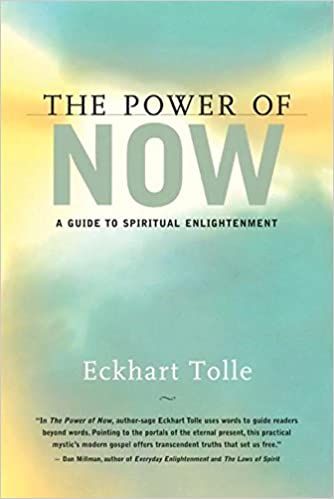
A critical first step toward greater self-insight involves ceasing to confuse your true self with the endless stream of thoughts flowing through your mind.
The bestselling book The Power of Now takes readers on a journey to find their deepest self through the lens of mindfulness and spirituality.
The book guides the reader through steps to help recognize and free themselves from ego in the form of defense mechanisms, automatic negative habits, and over-identification with thought. From here, readers can then discover their true nature and lasting contentment, rooted in the present moment.
Find the book on Amazon .
2. Self-Discovery Questions: 155 Breakthrough Questions to Accelerate Massive Action – Barrie Davenport
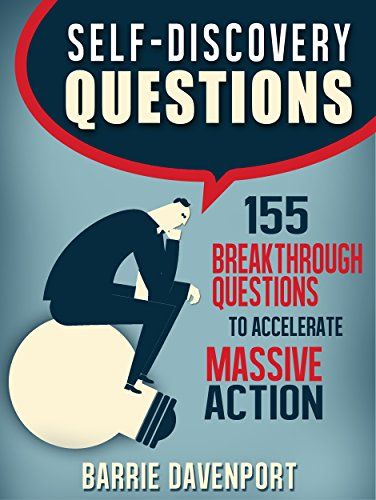
Not all of us have the resources to employ a self-discovery coach, making it all the more important to know what questions to ask on your self-discovery journey.
Barrie Davenport’s book of 155 powerful questions is a perfect companion for self-reflection and journaling, helping readers become less reactive and take charge of their lives and destiny.
Once you become acquainted with your answers, you can strengthen self-awareness , break out of automatic patterns, and feel empowered to make positive new life changes.
3. The 365 Self-Discovery Journal: One Year of Reflection & Development – Created by 21 Exercises
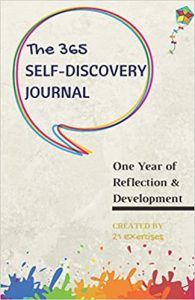
Journaling remains one of the best ways to pursue self-discovery and greater self-insight (Charles, 2010).
This book provides journal lovers with a year’s worth of challenging and original questions to guide self-discovery.
By combining each prompt with thought-provoking poems and quotes, this book is an excellent tool to help steadily expand the reader’s comfort zone and curiosity across domains ranging from career and finances to love and relationships.
4. The Quenza app
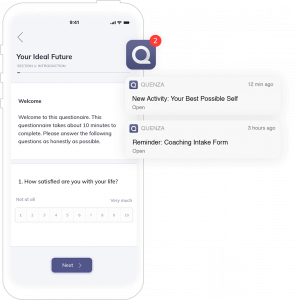
Quenza was designed by our very own team as a one-stop resource for coaches and psychologists wishing to remotely support their clients’ self-inquiry between scheduled sessions.
The app links with an online dashboard and growing library of science-backed activities you can customize and send directly to your clients’ smart devices, including audio meditations, guided visualizations, and many thought-provoking reflections.
Try the app, platform, and entire library of pre-built activities for 30 days for just $1.
5. The Waking Up app
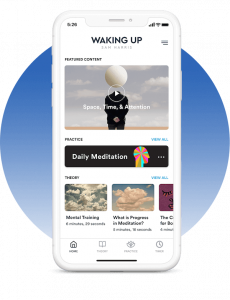
While Western takes on meditation tend to emphasize health and stress reduction, there is much more we can discover about ourselves through this powerful practice.
Waking Up , developed by philosopher and neuroscientist Sam Harris, features a rich array of audio-based meditations, exercises, and conversations with leading experts and teachers to help you make profound discoveries about the nature of your own mind.
This app is a top-rated resource for those seeking to dismantle illusions of the self and rediscover their true nature and purpose.
6. The Reflectly app

With the growing recognition of journaling as a tool for self-insight, new technologies are emerging to support this powerful practice.
Reflectly is a modern journaling app for self-care and greater happiness. Drawing on evidence-based approaches from positive psychology, mindfulness, and Cognitive-Behavioral Therapy, this app serves as an AI companion to help you manage negative thoughts and find greater happiness.
Among its personalized functions, the app includes daily quotes, a mood tracker , and personalized insights via its reporting features.
Throughout this post, we’ve discussed the importance of clarifying values to better understand what brings meaning throughout one’s journey of self-discovery. To this end, we invite you to check out our free Meaning & Valued Living Exercises Pack .
This pack features three of our top tools from the Positive Psychology Toolkit©, all of which center on the theme of values-based living:
- The Top 5 Values This exercise draws on key principles of Acceptance and Commitment Therapy to help clients begin brainstorming their values. Following this, clients will then prioritize these values in a list to identify those most central to who they are.
- Self-Eulogy This exercise invites clients to consider how they’d like to be remembered at their funeral as a means to identify and clarify values. Based on this, they can then consider how well they are living in alignment with these values.
- The Scoreboard Metaphor This exercise helps clients recognize how to enact their values through goal-setting. In particular, it draws on the metaphor of a basketball game to illustrate how living into one’s values is an ongoing process and that the paths by which we pursue our goals are opportunities to enact our values in daily life.
You can access all three exercises for free by downloading our Meaning & Valued Living Exercises Pack .
If you’re looking for more science-based ways to help others discover meaning, this collection contains 17 validated meaning tools for practitioners. Use them to help others choose directions for their lives in alignment with what is truly important to them.
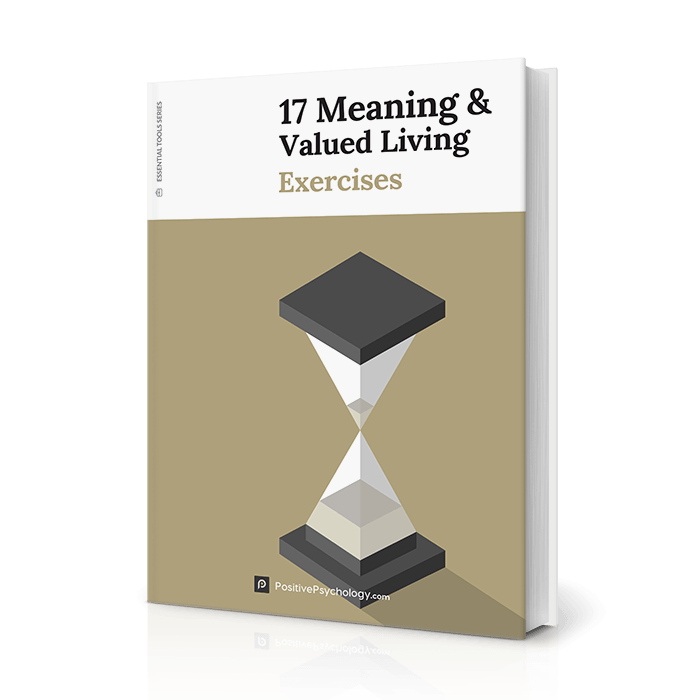
17 Tools To Encourage Meaningful, Value-Aligned Living
This 17 Meaning & Valued Living Exercises [PDF] pack contains our best exercises for helping others discover their purpose and live more fulfilling, value-aligned lives.
Created by Experts. 100% Science-based.
Self-discovery is an ongoing process of stripping away that which is unimportant, reviewing our core values, and seeking to live in greater alignment with these inner truths.
Importantly, anyone can take steps toward greater self-knowledge . All that’s required is an attitude of curiosity and regular time out for meditation, reflection, or self-questioning.
We hope this article has left you feeling equipped for your journey of self-discovery, and if you decide to try out any of the tools or exercises we’ve explored, be sure to let us know in the comments.
We’d love to hear from you.
We hope you enjoyed reading this article. Don’t forget to download our three Meaning and Valued Living Exercises for free .
- 21 Exercises. (2018). The 365 self-discovery journal: One year of reflection & development. Author.
- Charles, J. P. (2010). Journaling: Creating space for “I”. Creative Nursing , 16 (4), 180–184.
- Davenport, B. (2015). Self-discovery questions: 155 Breakthrough questions to accelerate massive action. Bold Living Press.
- Elevate Life Project. (n.d.). Self discovery coaching . Retrieved October 11, 2021 from https://elevatelifeproject.com/self-discovery-coaching/
- Hollis, B. (2019, July 16). Who am I? Journaling prompts for self-discovery and self-reflection. Learning to Be Free . Retrieved October 11, 2021 from https://www.learningtobefree.com/2019/07/16/journaling-prompts-for-self-discovery/
- Horney, K. (1950). Neurosis and human growth: The struggle toward self-realization . Norton.
- Pagedar, A. (2021). Finding awareness: The journey of self-discovery . Author.
- Tolle, E. (2004). The power of now: A guide to spiritual enlightenment. New World Library.
- Waterman, A. S. (2011). Eudaimonic identity theory: Identity as self-discovery. In S. Schwartz, K. Luyckx, & V. Vignoles (Eds.), Handbook of identity theory and research (pp. 357–379). Springer.
- Waterman, A. S., Schwartz, S. J., Zamboanga, B. L., Ravert, R. D., Williams, M. K., Bede Agocha, V., … Brent Donnellan, M. (2010). The Questionnaire for Eudaimonic Well-Being: Psychometric properties, demographic comparisons, and evidence of validity. The Journal of Positive Psychology , 5 (1), 41–61.
Share this article:
Article feedback
What our readers think.
This is a great article for self-discovery, I recommend it to all, it’s a must read for the young minds.
Thanks to a great counselor. I appreciate your encouragement and efforts that have served as an eyes opener to self discovery and other resources that is helpful.
You have some great resources listed here in this article. Thanks for the great read! -Ryan
Appreciated, Nicole, for insight well done to start kicking where need be. Keep up te good work!
Thanks Nicole. I will explore some of the resources which sounds great. I work with medical students, some of whom are at the very beginning of learning reflective approaches to enhance their self knowledge. The challenge is always to find a variety of ways to promote engagement. You have given me some helpful ideas.
Thank You Dr, Nicole.
I have left you a message on LinkedIn.
Thank you so much for this wonderful article. Very useful and helps in the journey of self awareness and so helpful to the therapist and counselors who are using these resources to support clients. Heartfelt thanks and gratitude for all the resources that benefit the clients and counselors who otherwise would not be able to access such great quality articles and resources. Thank you. As a counselor who is doing a lot of free counseling these resources and articles are so helpful, cause I cannot afford them otherwise. Thanks for supporting the counselors and therapist and clients who ultimately benefit.
Thanks, Nicole … you shared a very interesting set of perspective.
Let us know your thoughts Cancel reply
Your email address will not be published.
Save my name, email, and website in this browser for the next time I comment.
Related articles

Reparenting: Seeking Healing for Your Inner Child
In our work as therapists, we often encounter the undeniable truth: we never truly outgrow our inner child. A youthful part within us persists, sometimes [...]

30 Best Self-Exploration Questions, Journal Prompts, & Tools
Life is constantly in flux – our environment and ‘self’ change continually. Self-exploration helps us make sense of who we are, where we are, and [...]
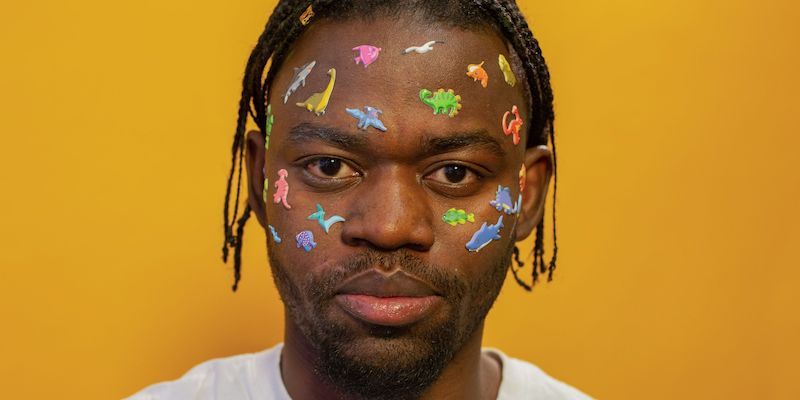
Inner Child Healing: 35 Practical Tools for Growing Beyond Your Past
Many clients enter therapy because they have relationship patterns that they are tired of repeating (Jackman, 2020). They may arrive at the first session asking, [...]
Read other articles by their category
- Body & Brain (48)
- Coaching & Application (57)
- Compassion (26)
- Counseling (51)
- Emotional Intelligence (24)
- Gratitude (18)
- Grief & Bereavement (21)
- Happiness & SWB (40)
- Meaning & Values (26)
- Meditation (20)
- Mindfulness (45)
- Motivation & Goals (45)
- Optimism & Mindset (34)
- Positive CBT (27)
- Positive Communication (20)
- Positive Education (47)
- Positive Emotions (32)
- Positive Leadership (17)
- Positive Parenting (2)
- Positive Psychology (33)
- Positive Workplace (37)
- Productivity (16)
- Relationships (47)
- Resilience & Coping (35)
- Self Awareness (21)
- Self Esteem (37)
- Strengths & Virtues (30)
- Stress & Burnout Prevention (34)
- Theory & Books (46)
- Therapy Exercises (37)
- Types of Therapy (64)

Self Reflection Essay

What goes through your mind when you have to write a self reflection essay? Do you ponder on your life choices, the actions you take to get where you want to be or where you are now? If you answered yes and yes to both of the questions, you are on the right track and have some idea on what a reflection essay would look like. This article would help give you more ideas on how to write a self reflection essay , how it looks like, what to put in it and some examples for you to use. So what are you waiting for? Check these out now.
10+ Self Reflection Essay Examples
1. self reflection essay template.
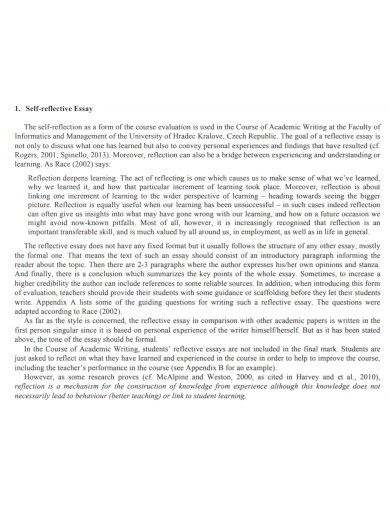
Size: 27 KB
2. Project Self Reflection Essay
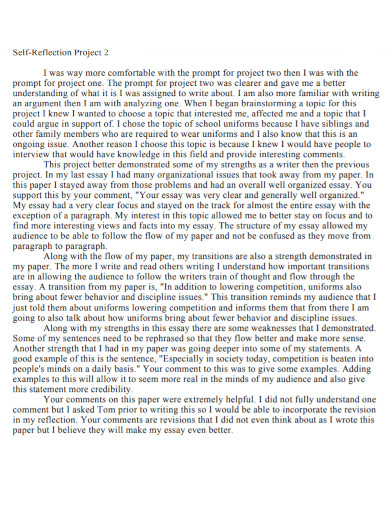
Size: 35 KB
3. Final Self Reflection Essay
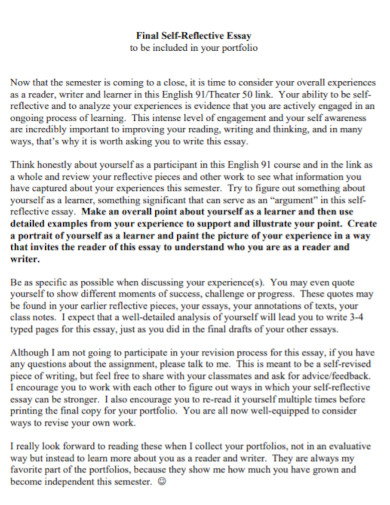
4. Internship Self Reflection Essay
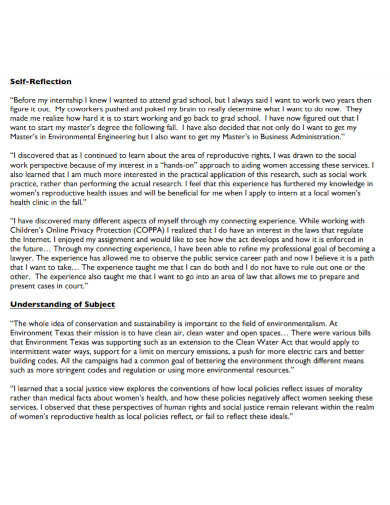
Size: 36 KB
5. Student Self Reflection Essay
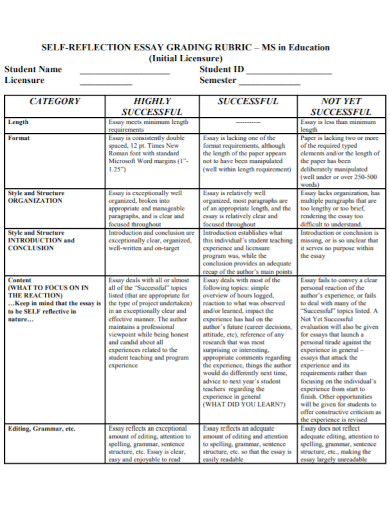
Size: 267 KB
6. Basic Self Reflection Essay
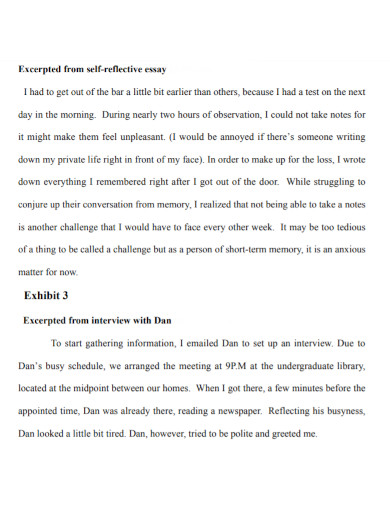
Size: 123 KB
7. College Self Reflection Essay
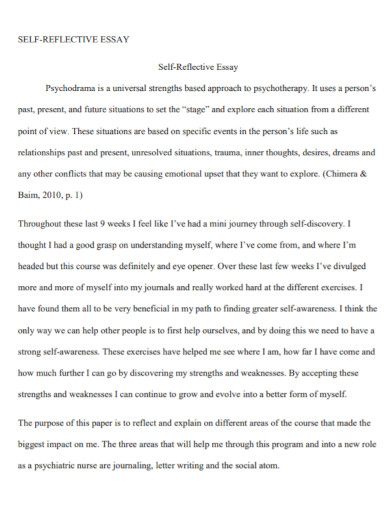
Size: 256 KB
8. Self Reflection Essay Rubric
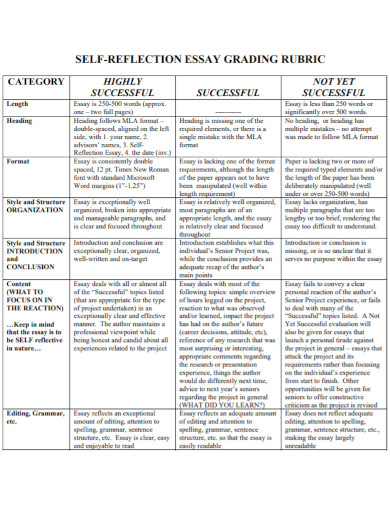
Size: 16 KB
9. Standard Self Reflection Essay
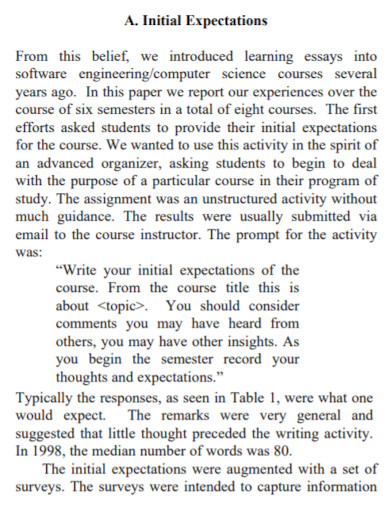
Size: 30 KB
10. Persuasive Essays Student Self-Reflection
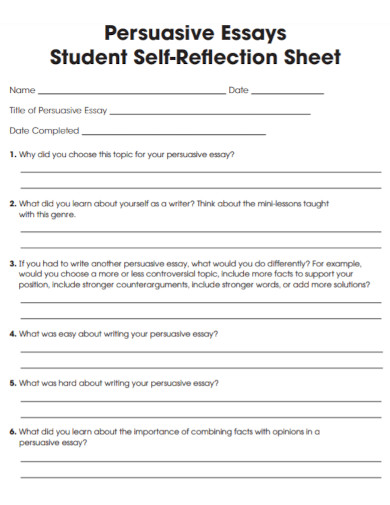
Size: 24 KB
11. Self Reflection Essay in Higher Education
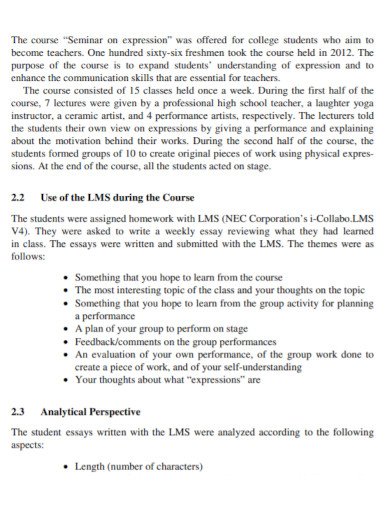
Size: 139 KB
Defining Self
A person’s self that is different from the rest. On occasions it is considered as an object of a person’s view.
Defining Self Reflection
A self reflection is often described as taking a step back to reflect on your life. To take a break and observe how far you have become, the obstacles you have gone through and how they have affected your life, behavior and belief.
Defining Self Reflection Essay
A self- reflection essay is a type of essay that makes you express the experiences you have gone through in life based on a topic you have chosen to write about. It is a personal type of essay that you write about. It makes you reflect on your life and journey to who you are today. The struggles, the fears, the triumphs and the actions you have taken to arrive at your current situation.
Tips on Writing a Self Reflection Essay
When writing a self reflection essay, there are some guidelines and formats to follow. But I am here to give you some tips to write a very good self reflection essay. These tips are easy to follow and they are not as complicated as some might believe them to be. Let’s begin. To write a good self reflection essay, one must first do:
- Think : Think about what you want to write. This is true for the title of your essay as well. Thinking about what to write first can save you a lot of time. After this tip, we move on to the next one which is:
- Drafting : As much as it sounds like a waste of time and effort, drafting what you are preparing to write is helpful. Just like in the first tip, drafting is a good way of writing down what you want and to add or take out what you will be writing later.
- State the purpose : Why are you writing this essay? State the purpose of the essay . As this is a self reflective essay, your purpose is to reflect on your life, the actions you did to reach this point of your life. The things you did to achieve it as well.
- Know your audience : Your self reflection essay may also depend on your audience. If you are planning on reading out loud your essay, your essay should fit your audience. If your audience is your team members, use the correct wording.
- Share your tips: This essay gives you the opportunity to share how you have achieved in life. Write down some tips for those who want to be able to achieve the same opportunity you are in right now.
How long or short can my self reflection essay be?
This depends on you. You may write a short self reflection essay, and you may also write a long one. The important thing there is stating the purpose of you writing your essay.
Writing a self reflection essay, am I allowed to write everything about my life?
The purpose of the self reflection essay is to reflect on a topic you choose and to talk about it.
Is there a limit of words to write this type of essay?
Yes, as much as possible stick to 300-700 words. But even if it may be this short, don’t forget to get creative and true in your essay.
A self reflective essay is a type of essay that people write to reflect on their lives. To reflect on a certain topic of their life and talk about it. Most of the time, this type of essay is short because this is merely to take a step back and watch your life throughout the beginning till the present time. Writing this type of essay may be a bit difficult for some as you have to dive deep into your life and remember the triumphs and the loss. The beauty of this essay though is the fact that you are able to see how far you have reached, how far you have overcome.

Self Reflection Essay Generator
Text prompt
- Instructive
- Professional
Write a Self Reflection Essay on a time you overcame a personal obstacle.
Reflect on your personal growth over the last year in your Self Reflection Essay.
- Bipolar Disorder
- Therapy Center
- When To See a Therapist
- Types of Therapy
- Best Online Therapy
- Best Couples Therapy
- Best Family Therapy
- Managing Stress
- Sleep and Dreaming
- Understanding Emotions
- Self-Improvement
- Healthy Relationships
- Student Resources
- Personality Types
- Guided Meditations
- Verywell Mind Insights
- 2023 Verywell Mind 25
- Mental Health in the Classroom
- Editorial Process
- Meet Our Review Board
- Crisis Support
The Importance of Self-Reflection: How Looking Inward Can Improve Your Mental Health
Sanjana is a health writer and editor. Her work spans various health-related topics, including mental health, fitness, nutrition, and wellness.
:max_bytes(150000):strip_icc():format(webp)/SanjanaGupta-d217a6bfa3094955b3361e021f77fcca.jpg)
Dr. Sabrina Romanoff, PsyD, is a licensed clinical psychologist and a professor at Yeshiva University’s clinical psychology doctoral program.
:max_bytes(150000):strip_icc():format(webp)/SabrinaRomanoffPhoto2-7320d6c6ffcc48ba87e1bad8cae3f79b.jpg)
Sunwoo Jung / Getty Images
Why Is Self-Reflection So Important?
When self-reflection becomes unhealthy, how to practice self-reflection, what to do if self-reflection makes you uncomfortable, incorporating self-reflection into your routine.
How well do you know yourself? Do you think about why you do the things you do? Self-reflection is a skill that can help you understand yourself better.
Self-reflection involves being present with yourself and intentionally focusing your attention inward to examine your thoughts, feelings, actions, and motivations, says Angeleena Francis , LMHC, executive director for AMFM Healthcare.
Active self-reflection can help grow your understanding of who you are , what values you believe in, and why you think and act the way you do, says Kristin Wilson , MA, LPC, CCTP, RYT, chief experience officer for Newport Healthcare.
This article explores the benefits and importance of self-reflection, as well as some strategies to help you practice it and incorporate it into your daily life. We also discuss when self-reflection can become unhealthy and suggest some coping strategies.
Self-reflection is important because it helps you form a self-concept and contributes toward self-development.
Builds Your Self-Concept
Self-reflection is critical because it contributes to your self-concept, which is an important part of your identity.
Your self-concept includes your thoughts about your traits, abilities, beliefs, values, roles, and relationships. It plays an influential role in your mood, judgment, and behavioral patterns.
Reflecting inward allows you to know yourself and continue to get to know yourself as you change and develop as a person, says Francis. It helps you understand and strengthen your self-concept as you evolve with time.
Enables Self-Development
Self-reflection also plays a key role in self-development. “It is a required skill for personal growth ,” says Wilson.
Being able to evaluate your strengths and weaknesses, or what you did right or wrong, can help you identify areas for growth and improvement, so you can work on them.
For instance, say you gave a presentation at school or work that didn’t go well, despite putting in a lot of work on the project. Spending a little time on self-reflection can help you understand that even though you spent a lot of time working on the project and creating the presentation materials, you didn’t practice giving the presentation. Realizing the problem can help you correct it. So, the next time you have to give a presentation, you can practice it on your colleagues or loved ones first.
Or, say you’ve just broken up with your partner. While it’s easy to blame them for everything that went wrong, self-reflection can help you understand what behaviors of yours contributed to the split. Being mindful of these behaviors can be helpful in other relationships.
Without self-reflection, you would continue to do what you’ve always done and as a result, you may continue to face the same problems you’ve always faced.
Benefits of Self-Reflection
These are some of the benefits of self-reflection, according to the experts:
- Increased self-awareness: Spending time in self-reflection can help build greater self-awareness , says Wilson. Self-awareness is a key component of emotional intelligence. It helps you recognize and understand your own emotions, as well as the impact of your emotions on your thoughts and behaviors.
- Greater sense of control: Self-reflection involves practicing mindfulness and being present with yourself at the moment. This can help you feel more grounded and in control of yourself, says Francis.
- Improved communication skills: Self-reflection can help you improve your communication skills, which can benefit your relationships. Understanding what you’re feeling can help you express yourself clearly, honestly, and empathetically.
- Deeper alignment with core values: Self-reflection can help you understand what you believe in and why. This can help ensure that your words and actions are more aligned with your core values, Wilson explains. It can also help reduce cognitive dissonance , which is the discomfort you may experience when your behavior doesn’t align with your values, says Francis.
- Better decision-making skills: Self-reflection can help you make better decisions for yourself, says Wilson. Understanding yourself better can help you evaluate all your options and how they will impact you with more clarity. This can help you make sound decisions that you’re more comfortable with, says Francis.
- Greater accountability: Self-reflection can help you hold yourself accountable to yourself, says Francis. It can help you evaluate your actions and recognize personal responsibility. It can also help you hold yourself accountable for the goals you’re working toward.
Self-reflection is a healthy practice that is important for mental well-being. However, it can become harmful if it turns into rumination, self-criticism, self-judgment, negative self-talk , and comparison to others, says Wilson.
Here’s what that could look like:
- Rumination: Experiencing excessive and repetitive stressful or negative thoughts. Rumination is often obsessive and interferes with other types of mental activity.
- Self-judgment: Constantly judging yourself and often finding yourself lacking.
- Negative self-talk: Allowing the voice inside your head to discourage you from doing things you want to do. Negative self-talk is often self-defeating.
- Self-criticism: Constantly criticizing your actions and decisions.
- Comparison: Endlessly comparing yourself to others and feeling inferior.
Kristin Wilson, LPC, CCTP
Looking inward may activate your inner critic, but true self-reflection comes from a place of neutrality and non-judgment.
When anxious thoughts and feelings come up in self-reflection, Wilson says it’s important to practice self-compassion and redirect your focus to actionable insights that can propel your life forward. “We all have faults and room for improvement. Reflect on the behaviors or actions you want to change and take steps to do so.”
It can help to think of what you would say to a friend in a similar situation. For instance, if your friend said they were worried about the status of their job after they gave a presentation that didn’t go well, you would probably be kind to them, tell them not to worry, and to focus on improving their presentation skills in the future. Apply the same compassion to yourself and focus on what you can control.
If you are unable to calm your mind of racing or negative thoughts, Francis recommends seeking support from a trusted person in your life or a mental health professional. “Patterns of negative self-talk, self-doubt , or criticism should be addressed through professional support, as negative cognitions of oneself can lead to symptoms of depression if not resolved.”
Wilson suggests some strategies that can help you practice self-reflection:
- Ask yourself open-ended questions: Start off by asking yourself open-ended questions that will prompt self-reflection, such as: “Am I doing what makes me happy?” “Are there things I’d like to improve about myself?” or “What could I have done differently today?” “Am I taking anything or anyone for granted?” Notice what thoughts and feelings arise within you for each question and then begin to think about why. Be curious about yourself and be open to whatever comes up.
- Keep a journal: Journaling your thoughts and responses to these questions is an excellent vehicle for self-expression. It can be helpful to look back at your responses, read how you handled things in the past, assess the outcome, and look for where you might make changes in the future.
- Try meditation: Meditation can also be a powerful tool for self-reflection and personal growth. Even if it’s only for five minutes, practice sitting in silence and paying attention to what comes up for you. Notice which thoughts are fleeting and which come up more often.
- Process major events and emotions: When something happens in your life that makes you feel especially good or bad, take the time to reflect on what occurred, how it made you feel, and either how you can get to that feeling again or what you might do differently the next time. Writing down your thoughts in a journal can help.
- Make a self-reflection board: Create a self-reflection board of positive attributes that you add to regularly. Celebrate your authentic self and the ways you stay true to who you are. Having a visual representation of self-reflection can be motivating.
You may avoid self-reflection if it brings up difficult emotions and makes you feel uncomfortable, says Francis. She recommends preparing yourself to get comfortable with the uncomfortable before you start.
Think of your time in self-reflection as a safe space within yourself. “Avoid judging yourself while you explore your inner thoughts, feelings, and motives of behavior,” says Francis. Simply notice what comes up and accept it. Instead of focusing on fears, worries, or regrets, try to look for areas of growth and improvement.
“Practice neutrality and self-compassion so that self-reflection is a positive experience that you will want to do regularly,” says Wilson.
Francis suggests some strategies that can help you incorporate self-reflection into your daily routine:
- Dedicate time to it: it’s important to dedicate time to self-reflection and build it into your routine. Find a slot that works for your schedule—it could be five minutes each morning while drinking coffee or 30 minutes sitting outside in nature once per week.
- Pick a quiet spot: It can be hard to focus inward if your environment is busy or chaotic. Choose a calm and quiet space that is free of distractions so you can hear your own thoughts.
- Pay attention to your senses: Pay attention to your senses. Sensory input is an important component of self-awareness.
Nowak A, Vallacher RR, Bartkowski W, Olson L. Integration and expression: The complementary functions of self-reflection . J Pers . 2022;10.1111/jopy.12730. doi:10.1111/jopy.12730
American Psychological Association. Self-concept .
Dishon N, Oldmeadow JA, Critchley C, Kaufman J. The effect of trait self-awareness, self-reflection, and perceptions of choice meaningfulness on indicators of social identity within a decision-making context . Front Psychol . 2017;8:2034. doi:10.3389/fpsyg.2017.02034
Drigas AS, Papoutsi C. A new layered model on emotional intelligence . Behav Sci (Basel) . 2018;8(5):45. doi:10.3390/bs8050045
American Psychological Association. Rumination .
By Sanjana Gupta Sanjana is a health writer and editor. Her work spans various health-related topics, including mental health, fitness, nutrition, and wellness.
- Entertainment
- Environment
- Information Science and Technology
- Social Issues
Home Essay Samples Life Personality
Describe Yourself: My Journey of Self-Discovery and Self-Reflection
*minimum deadline
Cite this Essay
To export a reference to this article please select a referencing style below

- Moral Development
Related Essays
Need writing help?
You can always rely on us no matter what type of paper you need
*No hidden charges
100% Unique Essays
Absolutely Confidential
Money Back Guarantee
By clicking “Send Essay”, you agree to our Terms of service and Privacy statement. We will occasionally send you account related emails
You can also get a UNIQUE essay on this or any other topic
Thank you! We’ll contact you as soon as possible.
Unlocking Self-Discovery: Powerful Coaching Worksheets for Reflection
The power of coaching worksheets.
Coaching worksheets play a crucial role in the process of self-reflection and personal growth. These structured tools provide individuals with a framework to explore their thoughts, emotions, and experiences in a organized manner. By engaging in self-reflection through coaching worksheets, individuals can gain deeper insights into themselves and unlock their true potential.
Understanding the Role of Coaching Worksheets
Coaching worksheets serve as a guide for individuals to delve into various aspects of their lives. They encourage introspection and help individuals identify their strengths, weaknesses, goals, values, and more. These worksheets prompt individuals to answer thought-provoking questions, engage in exercises, and document their reflections. By doing so, individuals gain a clearer understanding of themselves and the areas they wish to focus on for personal growth.
Coaching worksheets can be used by psychologists, coaches, practitioners, therapists, and anyone interested in self-improvement. They provide a structured approach to self-reflection, making the process more accessible and effective. With the help of coaching worksheets, individuals can explore their thoughts and emotions, gain clarity, set goals, and develop strategies to overcome challenges.
Benefits of Using Worksheets for Self-Reflection
Using coaching worksheets for self-reflection offers numerous benefits. Here are some key advantages:
- Organization and Structure : Coaching worksheets provide a clear structure for self-reflection, making the process more organized and focused. They guide individuals through a series of questions, exercises, or activities, ensuring a comprehensive exploration of their thoughts and feelings.
- Clarity and Self-Awareness : By engaging in self-reflection with coaching worksheets, individuals gain a deeper understanding of themselves. They become more aware of their values, strengths, weaknesses, and areas for improvement. This increased self-awareness allows individuals to make more informed decisions and take actions aligned with their true selves.
- Goal Setting and Progress Tracking : Coaching worksheets often include sections for goal setting. By setting clear and specific goals, individuals can track their progress and measure their achievements. This process fosters motivation, accountability, and a sense of accomplishment.
- Facilitation of Change : Coaching worksheets provide a structured framework for individuals to identify and address areas of personal growth. By reflecting on their thoughts, emotions, and behaviors, individuals can identify patterns, challenge limiting beliefs, and develop strategies for positive change.
Coaching worksheets are valuable tools for self-discovery and personal development. They provide a structured approach to self-reflection, guiding individuals on a journey of exploration and growth. Whether it’s goal setting, values assessment, or self-assessment, coaching worksheets offer a powerful means to unlock self-discovery.
Exploring Different Coaching Worksheets
Coaching worksheets are powerful tools that facilitate self-reflection and personal growth. They provide a structured framework for individuals to delve into various aspects of their lives and gain a deeper understanding of themselves. In this section, we will explore three types of coaching worksheets commonly used for self-reflection: Goal Setting Worksheets , Values Assessment Worksheets , and Strengths and Weaknesses Worksheets .
Goal Setting Worksheets
Goal setting worksheets are designed to help individuals clarify their aspirations and create a roadmap for achieving them. These worksheets provide a structured framework to outline specific, measurable, achievable, relevant, and time-bound (SMART) goals. By breaking down goals into actionable steps, individuals gain clarity and develop a plan of action to turn their dreams into reality.
Table: Components of a Goal Setting Worksheet
Goal setting worksheets encourage individuals to consider their values, priorities, and long-term aspirations. By aligning goals with personal values and aspirations, individuals are more likely to stay motivated and committed to achieving them. For additional coaching worksheets and resources, visit our article on coaching worksheets for goal setting .
Values Assessment Worksheets
Values assessment worksheets provide a structured process for individuals to identify their core values. These worksheets prompt individuals to reflect on what is most important to them in various aspects of life, such as relationships, career, health, and personal growth. By clarifying personal values, individuals gain insights into what drives them and what they want to prioritize in their lives.
Table: Components of a Values Assessment Worksheet
Values assessment worksheets enable individuals to assess the alignment between their current actions and their values. This self-reflection helps individuals make conscious decisions that are in line with their values, leading to a greater sense of fulfillment and purpose. To explore more coaching worksheets and resources, check out our article on coaching worksheets for self-discovery .
Strengths and Weaknesses Worksheets
Strengths and weaknesses worksheets are designed to help individuals identify and leverage their strengths while addressing areas for improvement. These worksheets encourage individuals to reflect on their skills, talents, and personal qualities, as well as areas where they may face challenges. By understanding their strengths and weaknesses, individuals can make informed decisions, set realistic goals, and develop strategies for personal and professional growth.
Table: Components of a Strengths and Weaknesses Worksheet
Strengths and weaknesses worksheets encourage individuals to embrace their strengths and seek opportunities to apply them in different areas of life. At the same time, they provide a framework for individuals to identify areas for growth and development. For more coaching worksheets and resources, visit our article on coaching worksheets for self-improvement .
By exploring different coaching worksheets, individuals can embark on a journey of self-discovery and personal growth. These worksheets provide valuable insights, promote self-reflection, and assist individuals in gaining a deeper understanding of themselves. Whether it’s setting goals, assessing values, or identifying strengths and weaknesses, coaching worksheets serve as valuable tools on the path to self-discovery and personal transformation.
Worksheets for Self-Discovery
Self-discovery is a powerful journey that allows individuals to gain deeper insights into themselves, their values, and their personal growth. Coaching worksheets can be invaluable tools for facilitating this process of self-exploration and reflection. In this section, we will explore three types of coaching worksheets that can aid in self-discovery: self-assessment worksheets , personality assessment worksheets , and life wheel worksheets .
Self-Assessment Worksheets
Self-assessment worksheets provide a structured framework for individuals to examine various aspects of their lives, values, and goals. These worksheets often include thought-provoking questions and prompts that encourage introspection and self-reflection. By completing self-assessment worksheets, individuals can gain a clearer understanding of their strengths, weaknesses, interests, and values.
Self-assessment worksheets can focus on different areas, such as personal qualities, skills, and aspirations. They allow individuals to take stock of their current situation and identify areas for growth and improvement. The insights gained from self-assessment worksheets can be used to set meaningful goals and develop strategies for personal development. For a wide range of coaching worksheets, including self-assessment worksheets, visit our coaching worksheets resource.
Personality Assessment Worksheets
Personality assessment worksheets help individuals explore their unique personality traits, preferences, and behavioral patterns. These worksheets are designed to provide individuals with a deeper understanding of themselves and how they interact with the world around them. By completing personality assessment worksheets, individuals can gain insights into their communication styles, decision-making processes, and interpersonal dynamics.
Personality assessment worksheets often incorporate established personality frameworks, such as the Myers-Briggs Type Indicator (MBTI) or the Big Five personality traits. These frameworks help individuals identify their dominant personality traits and provide a language for discussing their personality characteristics. By understanding their personality type, individuals can gain valuable insights into their strengths, areas for development, and how they can leverage their unique qualities to achieve their goals.
Life Wheel Worksheets
Life wheel worksheets are visual tools that allow individuals to assess their level of satisfaction and fulfillment across various areas of life. The life wheel typically consists of different sections representing key life domains, such as career, relationships, health, and personal growth. Individuals rate their level of satisfaction or progress in each area, and the resulting life wheel provides a visual representation of their overall life balance.
Life wheel worksheets prompt individuals to consider their current state in each life domain and reflect on areas that may require attention or improvement. By identifying imbalances or areas of dissatisfaction, individuals can prioritize their goals and take steps towards achieving a more fulfilling and well-rounded life. Life wheel worksheets can be helpful for individuals seeking to align their actions and values with their desired life outcomes.
By utilizing self-assessment worksheets, personality assessment worksheets, and life wheel worksheets, individuals can embark on a journey of self-discovery and personal growth. These worksheets provide a structured framework for self-reflection and help individuals gain valuable insights into different aspects of their lives. Remember, coaching worksheets are versatile tools that can be customized to suit individual needs and goals.
Using Coaching Worksheets Effectively
To make the most of coaching worksheets for self-reflection, it’s essential to understand how to use them effectively. Here are three key strategies for maximizing the benefits of these powerful tools: creating a safe and supportive environment , setting clear goals and objectives , and reflecting and taking action .
Creating a Safe and Supportive Environment
Creating a safe and supportive environment is crucial for effective self-reflection. This environment should encourage openness, honesty, and non-judgment. As a coach or practitioner, it’s important to foster trust and create a space where individuals feel comfortable exploring their thoughts and emotions.
Ensure confidentiality by emphasizing that the information shared during self-reflection exercises is private. Encourage individuals to be authentic and vulnerable without fear of judgment. By establishing a safe and supportive environment, you can create the optimal conditions for self-discovery and personal growth.
Setting Clear Goals and Objectives
Before engaging in self-reflection using coaching worksheets, it’s important to set clear goals and objectives. Encourage individuals to identify what they hope to achieve through self-reflection. This could include gaining insight into their values, exploring their strengths and weaknesses, or setting meaningful goals.
Setting clear goals helps individuals focus their self-reflection efforts and provides a framework for their worksheets. It also allows for more targeted and purposeful self-exploration. By aligning the goals of self-reflection with the specific coaching worksheets used, individuals can make the most of their self-discovery journey.
Reflecting and Taking Action
The true power of coaching worksheets lies in the process of reflection and action. After completing the worksheets, individuals should take time to reflect on their responses and insights. Encourage them to consider the patterns, themes, and connections that emerge from their self-reflection.
Reflection should not end with insights alone. Encourage individuals to take action based on their self-reflection findings. Help them develop an action plan that incorporates their newfound self-awareness and supports their personal growth. Whether it’s setting specific goals, creating new habits, or seeking additional support, taking action is crucial for self-improvement.
By emphasizing the importance of reflection and action, coaching worksheets become a catalyst for personal transformation. Encourage individuals to revisit their worksheets periodically to track their progress and make adjustments as needed.
Remember, coaching worksheets are just one tool in the larger toolkit of personal development and self-reflection. They can be utilized alongside other coaching techniques and resources to support individuals in their self-discovery journey. Explore our coaching worksheets for a wide range of topics that can enhance self-reflection and personal growth.
Online Resources for Coaching Worksheets
When it comes to utilizing coaching worksheets for self-reflection and personal growth, there are various online resources available. These resources offer a wide range of websites and platforms where coaches, practitioners, therapists, and individuals can access a plethora of coaching worksheets to facilitate self-discovery and personal development.
Websites and Platforms
Numerous websites and platforms are specifically dedicated to providing coaching resources , including a vast collection of coaching worksheets. These resources offer a convenient way to access a diverse array of worksheets on various topics, such as goal setting, values assessment, and strengths and weaknesses analysis.
Coaching websites and platforms often provide free as well as paid worksheets, allowing users to choose the option that best suits their needs and preferences. Some platforms may require a subscription or offer premium content for a fee, while others provide free access to a selection of worksheets.
Free vs. Paid Worksheets
When exploring coaching worksheets online, it’s important to consider both free and paid options. Free worksheets can be an excellent starting point for self-reflection and personal growth, offering valuable insights and prompts without any financial commitment.
On the other hand, paid worksheets often provide additional features, more extensive content, and advanced tools for deeper self-exploration. These paid resources may be particularly beneficial for individuals seeking a more comprehensive and personalized coaching experience.
It’s worth noting that the quality and effectiveness of worksheets can vary across different websites and platforms. When using coaching worksheets, it’s essential to critically evaluate the source and the credibility of the content to ensure a meaningful and impactful self-reflection experience.
Customizing Worksheets for Your Needs
Many coaching websites and platforms allow users to customize worksheets according to their specific needs and goals. Customization options may include adding personal prompts, modifying existing questions, or adapting the layout of the worksheet.
By customizing coaching worksheets, individuals can tailor the content to address their unique circumstances, challenges, and aspirations. This flexibility enhances the relevance and effectiveness of the worksheets, making them more aligned with personal growth objectives.
In addition to customization features offered by online platforms, individuals can also create their own coaching worksheets using word processing software or other digital tools. This allows for complete control over the content, structure, and design, ensuring that the worksheets cater to specific preferences and requirements.
By leveraging the available online resources, individuals can access a wealth of coaching worksheets to support their self-discovery journey. Whether opting for free resources or investing in premium content, these worksheets provide valuable tools for reflection, personal growth, and transformation. It’s important to explore different websites and platforms, and choose the worksheets that resonate most with individual needs and goals.

Download free guide (PDF)
Discover how to engage your clients on autopilot while radically scaling your coaching practice.
Coach, This Changes Everything (Free PDF)
Home — Essay Samples — Life — Self Awareness — Self-Awareness Reflection
Self-awareness Reflection
- Categories: Self Awareness Self Reflection
About this sample

Words: 532 |
Published: Jan 30, 2024
Words: 532 | Page: 1 | 3 min read
Table of contents
Definition and components of self-awareness, importance of self-awareness, methods of developing self-awareness, self-awareness and personal growth, challenges and limitations of self-awareness.
- Emotional Intelligence: Why It Can Matter More Than IQ by Daniel Goleman
- Daring Greatly: How the Courage to Be Vulnerable Transforms the Way We Live, Love, Parent, and Lead by Brené Brown
- Radical Acceptance: Embracing Your Life With the Heart of a Buddha by Tara Brach

Cite this Essay
Let us write you an essay from scratch
- 450+ experts on 30 subjects ready to help
- Custom essay delivered in as few as 3 hours
Get high-quality help

Verified writer
- Expert in: Life

+ 120 experts online
By clicking “Check Writers’ Offers”, you agree to our terms of service and privacy policy . We’ll occasionally send you promo and account related email
No need to pay just yet!
Related Essays
1 pages / 742 words
4 pages / 1863 words
4 pages / 1598 words
1 pages / 514 words
Remember! This is just a sample.
You can get your custom paper by one of our expert writers.
121 writers online
Still can’t find what you need?
Browse our vast selection of original essay samples, each expertly formatted and styled
Related Essays on Self Awareness
‘Self-awareness, has evidently been the key issue from a formative and a transformative point of view’, is a rich and entangled topic. As individuals, we can never completely comprehend ourselves, if there is such a desire. In [...]
Self-awareness is a crucial aspect of human consciousness and behavior. It refers to the ability to recognize and understand one's own thoughts, feelings, and behaviors. Private self-awareness, in particular, focuses on an [...]
Reflecting on my journey, I realize that my weakness is overthinking, a trait that has at times hindered my progress and clouded my decisions. Overthinking, characterized by incessant rumination and an unrelenting quest for [...]
Cultural self-awareness is an essential skill in today's interconnected and diverse world. It involves recognizing and understanding one's own cultural background, biases, and values, and how they influence interactions with [...]
Chang, E. (2016). The power of an open mind. Journal of Positive Psychology, 11(5), 569-571.Greene, J. D. (2013). Moral tribes: Emotion, reason, and the gap between us and them. Penguin Books.Krumrei-Mancuso, E. J., & Rouse, S. [...]
I prefer to be true to myself, even at the endangerment of finding the ridicule of others, rather than to be false and finding my own detestation. Why should I worry about what others think of me? I don’t give a shit about how [...]
Related Topics
By clicking “Send”, you agree to our Terms of service and Privacy statement . We will occasionally send you account related emails.
Where do you want us to send this sample?
By clicking “Continue”, you agree to our terms of service and privacy policy.
Be careful. This essay is not unique
This essay was donated by a student and is likely to have been used and submitted before
Download this Sample
Free samples may contain mistakes and not unique parts
Sorry, we could not paraphrase this essay. Our professional writers can rewrite it and get you a unique paper.
Please check your inbox.
We can write you a custom essay that will follow your exact instructions and meet the deadlines. Let's fix your grades together!
Get Your Personalized Essay in 3 Hours or Less!
We use cookies to personalyze your web-site experience. By continuing we’ll assume you board with our cookie policy .
- Instructions Followed To The Letter
- Deadlines Met At Every Stage
- Unique And Plagiarism Free

FLORENCE, Italy--( BUSINESS WIRE )--Brancacci Gallery is thrilled to announce the exhibition “ Metamorphosis and Me ,” the latest collection from acclaimed artist Amira. It is her chromatic odyssey into the heart of self-discovery. Not only a feast for the eyes but also a saga for the soul, her exhibition promises a transformative experience for all attendees.
Embarking from an ancient city enshrined with a diverse heritage, Amira’s artistic journey is a reflection of her vibrant backdrop. This collection reveals her visceral interplay of colours and textures as she delves into the emotional spectrum of human experience. Each canvas is not merely a painting; it’s an exploration, a narrative, and an invitation to viewers to embark on their transformative journeys.
“Metamorphosis and Me” delivers visual poetry divided into themed colour segments, each telling a segment of the story—a journey within a journey. Beginning with an embrace of the calming greens, the series embodies life's accumulated experiences. This progression unfolds through the emotive symphony of blues, reds, and purples, each underlying a period of change and reflection.
Paintings titled “ Conformity ” and “ Challenge ” take viewers through the complexities of human influence and the vibrant pulse of will and decision-making. The rich textures and interplay of acrylic and oil assert the essence not just of the beholding eyes but of the journeying spirit.
As we transition into the simmering intensity of “ Awakening ”, Amira’s canvas burns with the understanding of inner epiphany and profound awakening. The rich crimson hues of realisation and the transcendental whites convey an ascension to truth and the divine.
The narrative culminates from serene white to intense crimson, symbolising peace and self-acceptance. Pieces such as “ Acceptance ”, “ Harmony ”, and “ Clarity ” stand as testaments to Amira’s arrival at a new understanding of self, showcasing a celestial collection that calls for introspection, creating a truly resonant experience.
Discover Amira’s New Series, where artistry and spirituality entwine in enchanting allure.
About Amira:
Amira is a renowned artist known for her captivating paintings that celebrate her rich history and diverse heritage. Know to draw inspiration from her cultural heritage and deep connections to her hometown. Fuelled by passion, she finds liberation in painting, expressing emotions through colours and textures. Her work delves into human experience, aiming to evoke feelings and spark introspection, inviting viewers on a transformative journey.
Source: AETOSWire
Veronica De Blasi , +393474487635 [email protected]

Release Summary
Introducing Amira’s New “Metamorphosis and Me” Series – A Chromatic Tapestry of Self-Discovery

IMAGES
VIDEO
COMMENTS
In this paper "My Journey Of Self Discovery Essay Examples" we will talk about why self discovery is important and why we need to do it. High school has taught me about myself, and that is the most important lesson I could have learned. This metamorphosis has taken me from what I used to be to what I am now.
Understanding yourself is a fundamental pursuit that shapes the course of our lives and contributes to personal growth and well-being. As humans, we possess a complex and intricate inner world that often remains unexplored. Embarking on the journey of self-discovery allows us to unravel our thoughts, emotions, motivations, and desires, leading ...
Self Reflection Essay: My Journey of Self-development. Embarking on the journey of self-development is a deeply personal and transformative experience that can shape the course of one's life. As I reflect on my own journey of self-discovery and growth, I am reminded of the challenges and triumphs that have shaped me into the person I am today.
Reflective writing is a valuable tool for self-reflection and self-discovery, empowering students to navigate life's transitions with a deeper understanding of themselves and their desired path forward. ... It offers a safe and therapeutic outlet for self-expression, self-reflection, and self-care. Reflective essay writing empowers students ...
Discover our top examples on essays about discovering yourself, plus prompts to guide you in writing your next essay. Self-discovery is both a daunting and fantastic journey. Each person has a unique path to take. Reflecting on who you were, are, and will be is a lifelong adventure that includes constant self-examination.
Self-evaluation is a powerful tool for personal growth and development. It requires introspection, honesty, and a willingness to assess one's strengths and weaknesses. In this self-evaluation essay, I will candidly reflect on various aspects of my life, including my personal qualities, academic performance, and areas where I see opportunities ...
What makes me special is a mosaic of my background, personal values, unique experiences, and aspirations. It is an ongoing journey of self-discovery and growth, shaped by the people I've met, the challenges I've faced, and the values I hold dear. Embracing my background has taught me the beauty of diversity, while my personal values and beliefs ...
Chapter One: The Palette of Early Influences. The first strokes in narrative describing myself can be found in the memories of my childhood—the moments that laid the foundation of who I am today. Growing up, I was immersed in a family that valued curiosity, creativity, and compassion. From my parents' bedtime stories to my first forays into ...
Let your emotions, thoughts, and insights flow freely. Remember, the goal is not just to share an experience but to explore the reflective process that led to personal growth and self-discovery. Reflective Learning: Extracting Lessons. One of the most important aspects of a reflective essay is reflective learning.
Here is a list of 105 writing prompts for self-reflection and self-discovery. I hope this extensive list provides you with ideas and inspiration to help you explore and reflect on your thoughts via writing, blogging, journaling, or some other creative form. Self-development.
Reflective essay meaning also involves storytelling that invites your audience to connect with your narrative on a more personal level, making it a powerful tool for self-expression within the academic landscape. ... This essay style serves as a tool for self-discovery. Imagine recounting a pivotal life moment, like overcoming a fear of public ...
Reflective writing prompts for self-discovery can really help you understand yourself better. They provide a chance for emotional catharsis, allowing you to confront and resolve your inner conflicts. You'll gain deeper insight into your thoughts, feelings, and behaviors. Describe a time when you were overwhelmed by emotions.
4. The Quenza app. If you're a coach supporting your clients' journeys of self-discovery, you'll likely need some tailored tools for the job. Quenza was designed by our very own team as a one-stop resource for coaches and psychologists wishing to remotely support their clients' self-inquiry between scheduled sessions.
Looking back on my journey and hearing my parent's testimonies of my development and growth, my behaviors go hand in hand with Erikson's theories.
A self- reflection essay is a type of essay that makes you express the experiences you have gone through in life based on a topic you have chosen to write about. It is a personal type of essay that you write about. It makes you reflect on your life and journey to who you are today. The struggles, the fears, the triumphs and the actions you have ...
These are some of the benefits of self-reflection, according to the experts: Increased self-awareness: Spending time in self-reflection can help build greater self-awareness, says Wilson. Self-awareness is a key component of emotional intelligence. It helps you recognize and understand your own emotions, as well as the impact of your emotions ...
Personality is never easily defined. Many people have a hard time describing what they are. They like to think that they have all of these 'perfect' traits, but each one has advantages and disadvantages.
The quote suggests that self-reflection leads to self-discovery, guiding us towards personal growth and a deeper understanding of ourselves. ... - Albert Camus, The Myth of Sisyphus and Other Essays (1942) Albert Camus, a French philosopher, suggests that self-reflection requires stepping back from the external world to gain a deeper ...
Coaching worksheets play a crucial role in the process of self-reflection and personal growth. These structured tools provide individuals with a framework to explore their thoughts, emotions, and experiences in a organized manner. By engaging in self-reflection through coaching worksheets, individuals can gain deeper insights into themselves ...
Self-awareness Reflection. Self-awareness is the conscious knowledge of one's own character, feelings, motives, and desires. It is an essential aspect of personal growth and development, as it empowers individuals to understand themselves on a deeper level and make meaningful changes in their lives. In this essay, we will explore the definition ...
Reflective Essay On Self Discovery. I open the door of my home and feel the warmth that is taking me over. I sense the sweet smell of incense sticks and hear my children calling my name out loudly. Another day at University has gone and once again I return to my sacred and safe place. Personally, I crave and pursue safety.
It is her chromatic odyssey into the heart of self-discovery. Not only a feast for the eyes but also a saga for the soul, her exhibition promises a transformative experience for all attendees.